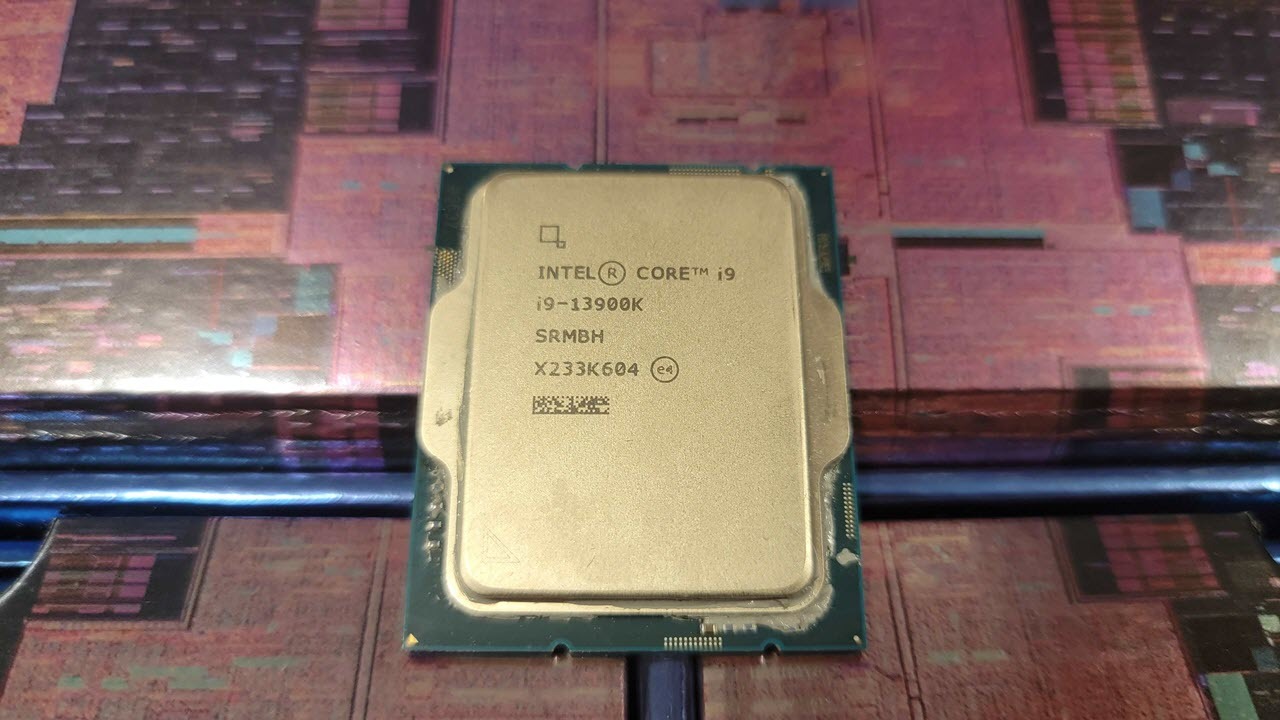Why you can trust Tom's Hardware
Gaming Performance on Intel Core i9-13900K and Core i5-13600K — The TLDR:
Below you can see the geometric mean of our gaming tests at 1080p and 1440p, with each resolution split into its own chart. Be aware that a different mix of game titles could yield somewhat different results (particularly with the Ryzen 7 5800X3D), but this serves as a solid overall indicator of gaming performance. We're testing with an Nvidia GeForce RTX 4090 to reduce GPU-imposed bottlenecks as much as possible, and differences between test subjects will shrink with lesser cards or higher resolutions and fidelity. You'll find further game-by-game breakdowns below.
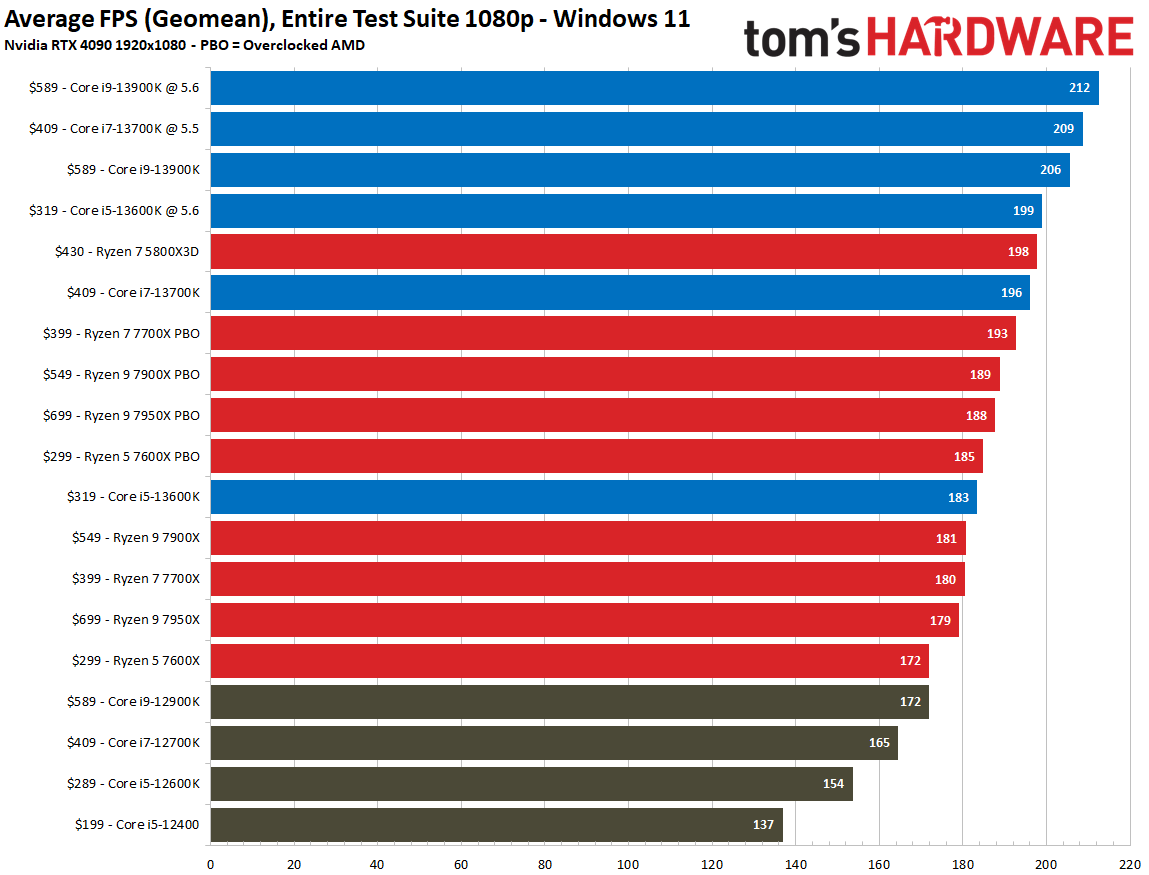
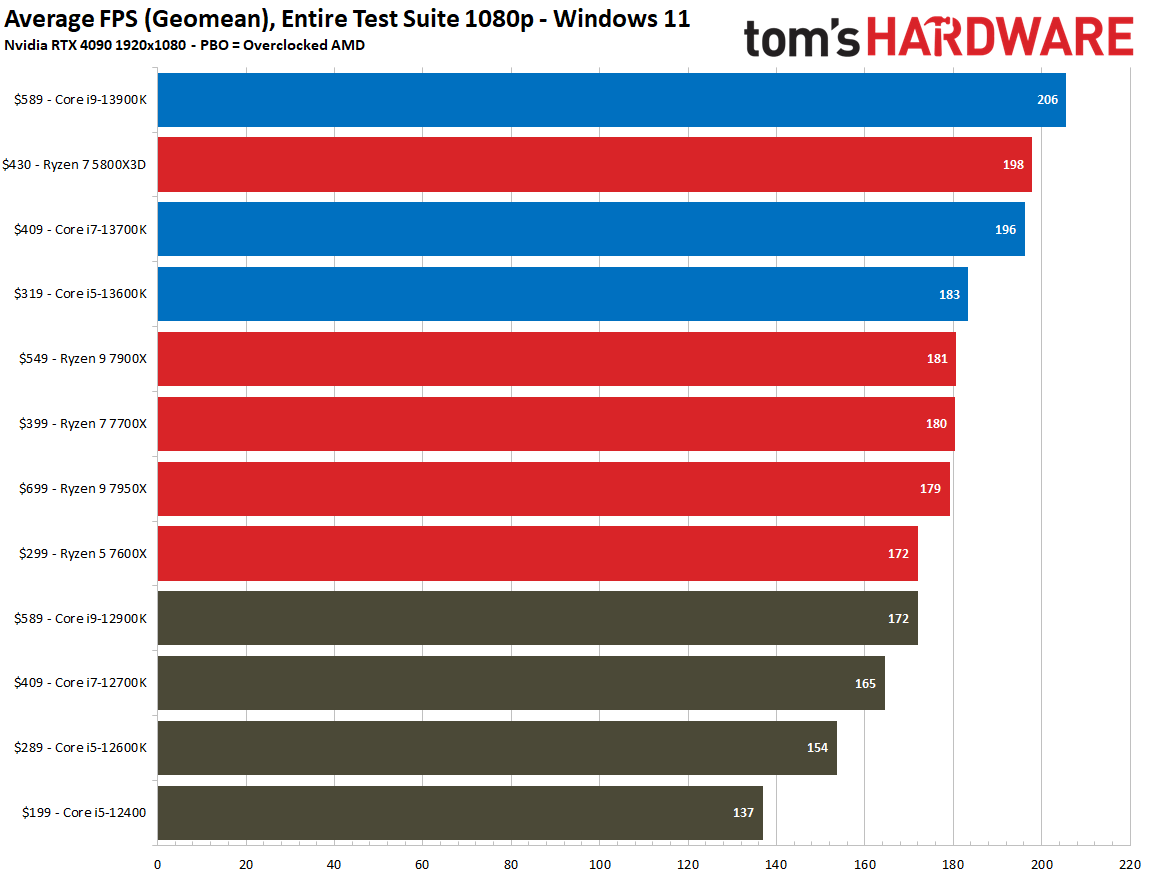
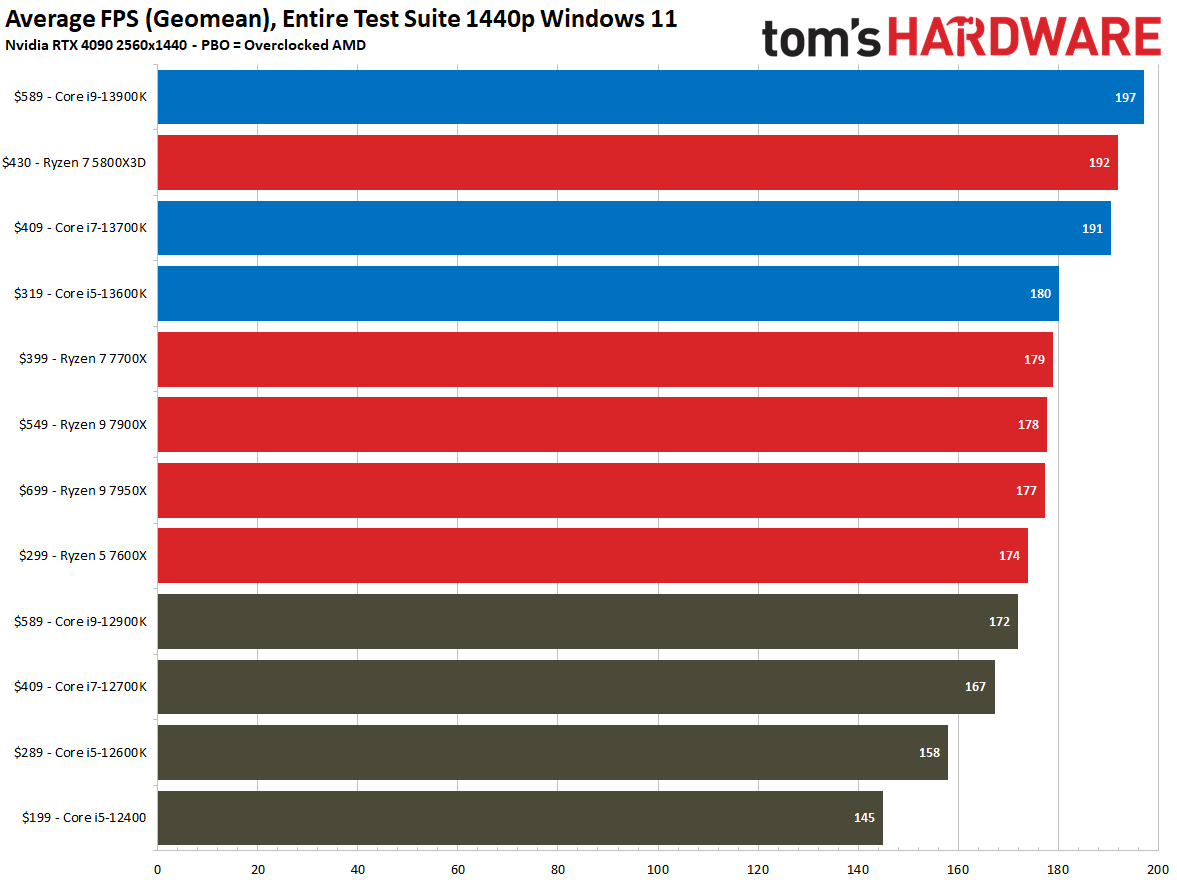
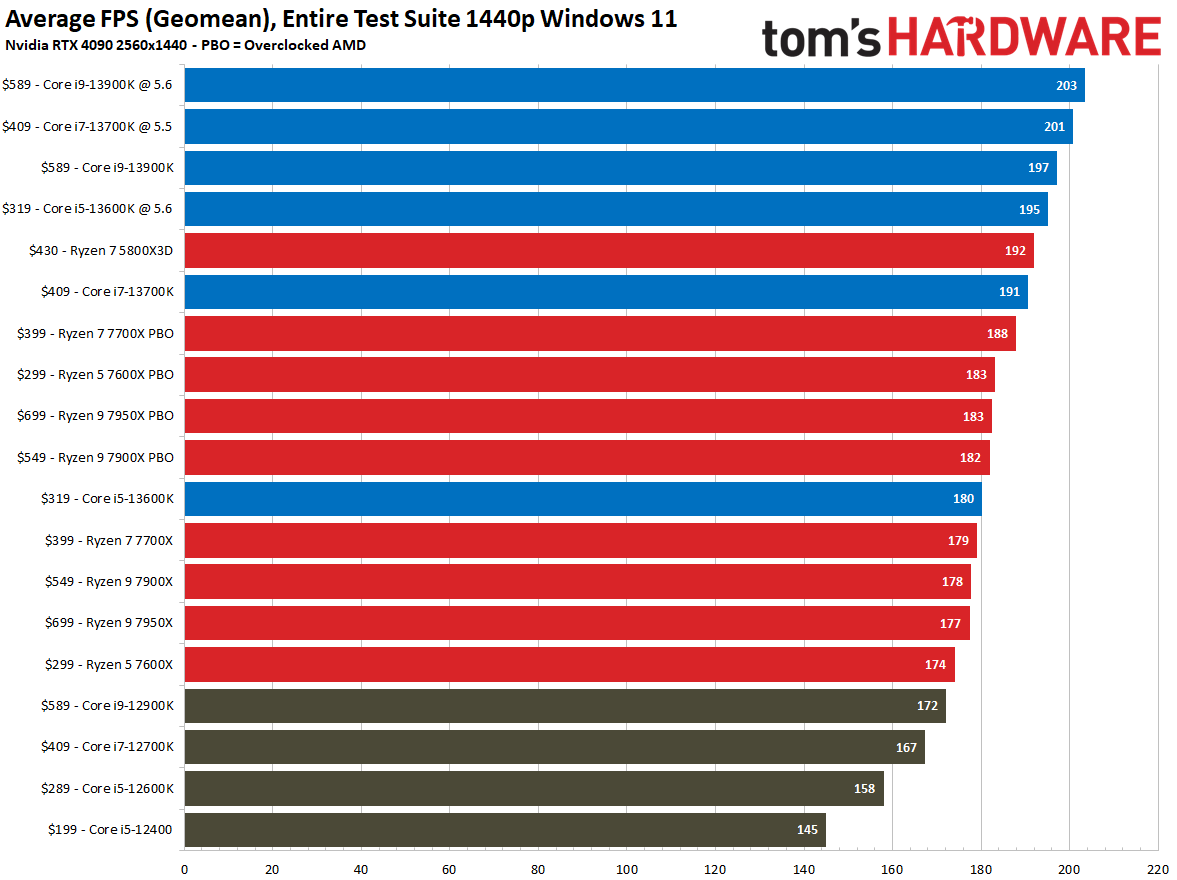
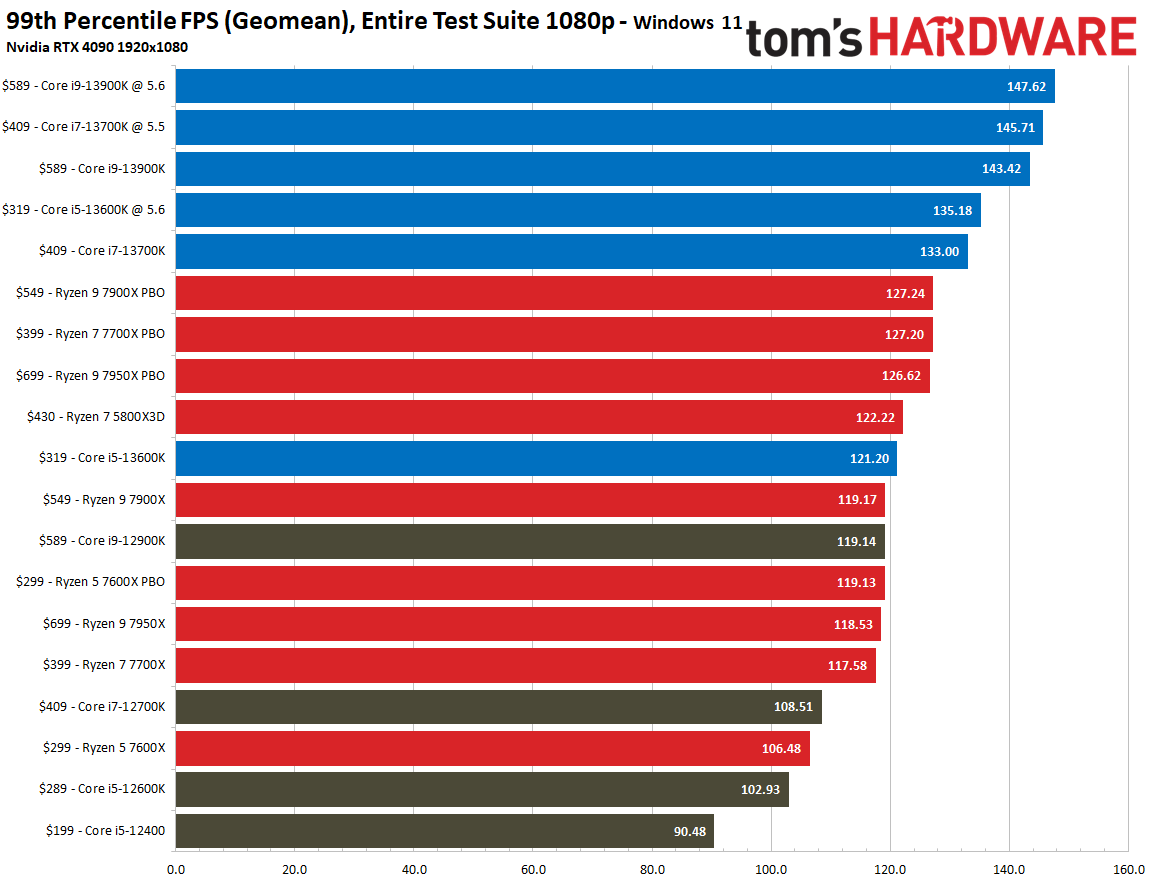
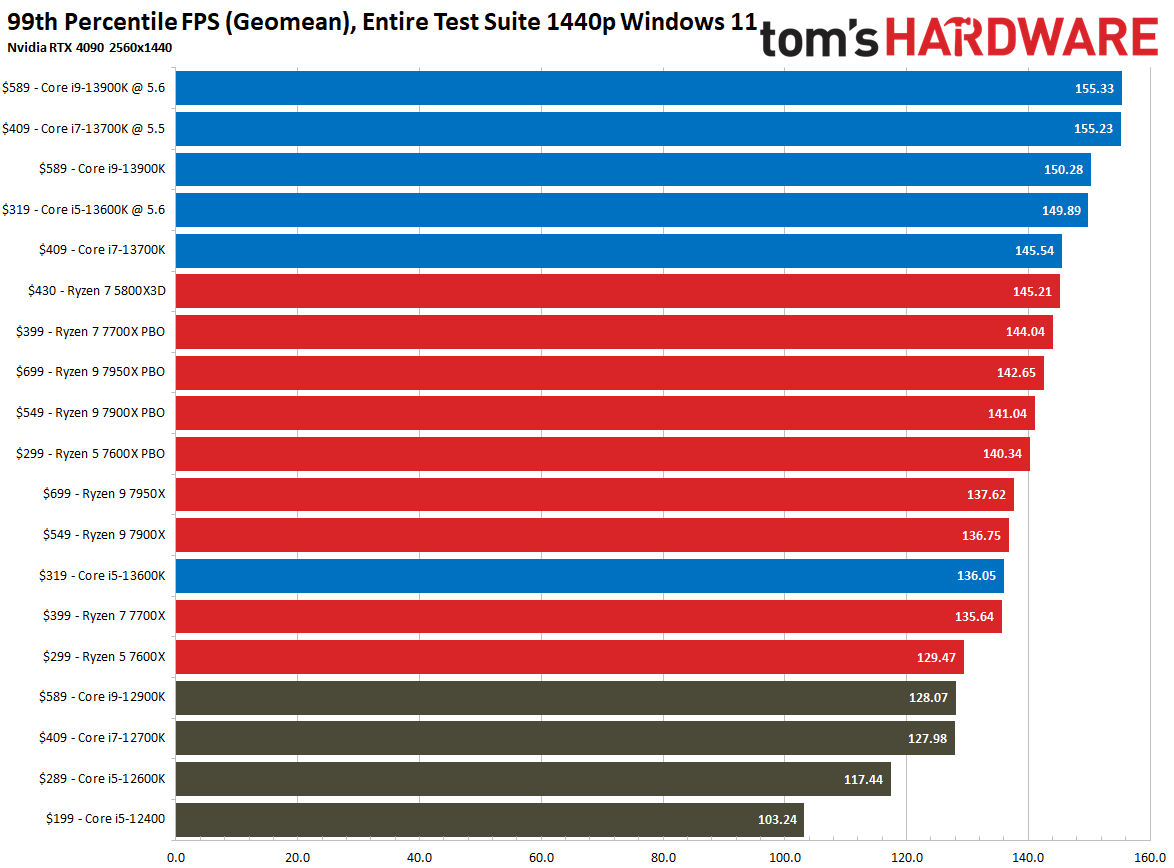
To simplify the charts, the first two slides feature only the stock configurations, while the remainder of the slides cover the same results but have the overclocked configurations added. We use that same approach for the individual gaming results below.
The $589 Core i9-13900K makes a case for being crowned the fastest 1080p gaming chip as it takes a 4% lead over the current champ, the $430 AMD Ryzen 7 5800X3D, at stock settings. However, unlike the 5800X3D, the 13900K offers a much more balanced profile that doesn't result in tradeoffs in applications, either. Notably, moving to 1440p shrinks the delta between the two chips to the imperceptible range. We'll see the winner between the Core i9-13900K and the Ryzen 7 5800X3D vary with different test suites, but here the Core i9-13900K is the overall gaming champ.
Zooming out to the Zen 4 Ryzen 7000 competitors, the 13900K is 14% faster than AMD's fastest standard chip, the $549 Ryzen 7 7900X. Of course, overclocking both chips shrinks the delta, but the 13900K maintains an insurmountable lead. The gen-on-gen comparison is pretty impressive, too: The Core i9-13900K is 19.8% faster than its prior-gen counterpart, the Core i9-12900K.
As always, if you aren't after performance in heavy productivity tasks, the Core i7 model takes the shine off the Core i9. The Core i7-13700K is a great high-performance gaming chip at its $409 price point, offering 95% of the 13900K's performance for $180 less. Better yet, you can overclock the chip and get basically identical performance to the Core i9-13900K. The 13700K is also 18.8% faster than the previous-gen 12700K.
But the Core i5 beats both of its pricier siblings in the price-to-performance department. The $319 Core i5-13600K is a stellar gaming chip — Intel raised the price by $30 over the prior-gen model, but here we can see the stock configuration beating AMD's entire Ryzen 7000 lineup at 1080p, albeit by slim margins. In addition, overclocking propels the Core i5-13600K to the same level as the Ryzen 7 5800X3D, an impressive feat, as it lands within ~5% of the Core i9-13900K.
The deltas in these charts are slim, and large deltas in individual game titles, as we see with the 5800X3D, impact cumulative measurements. As mentioned in the test setup section, we've seen a few odd test results with the Ryzen 7000 processors that find dual-chiplet models trailing single-chiplet models in some titles, which also impacts these measurements.
The Nvidia RTX 4090 delivers the largest gen-on-gen increase in GPU compute power in recent history, so we could see a wave of game optimizations to fully exploit the increased resources. That means these results could change, and as always, the competition between AMD and Intel chips can vary based on the title and the GPU you use, so it's best to make an informed decision based on the types of titles you play frequently. Be sure to check out the individual tests below.
| Tom's Hardware | 1080p Game Benchmarks | 1440p Game Benchmarks |
| $589 — Core i9-13900K | 100% | 100% |
| $430 — Ryzen 7 5800X3D | 96.3% | 97.4% |
| $409 — Core i7-13700K | 95.4% | 96.7% |
| $319 — Core i5-13600K | 89.2% | 91.4% |
| $549 — Ryzen 9 7900X | 87.9% | 90.2% |
| $399 — Ryzen 7 7700X | 87.8% | 90.8% |
| $699 — Ryzen 9 7950X | 87.2% | 90% |
| $299 — Ryzen 5 7600X | 83.7% | 88.3% |
Cyberpunk 2077 on Intel Core i9-13900K and Core i5-13600K
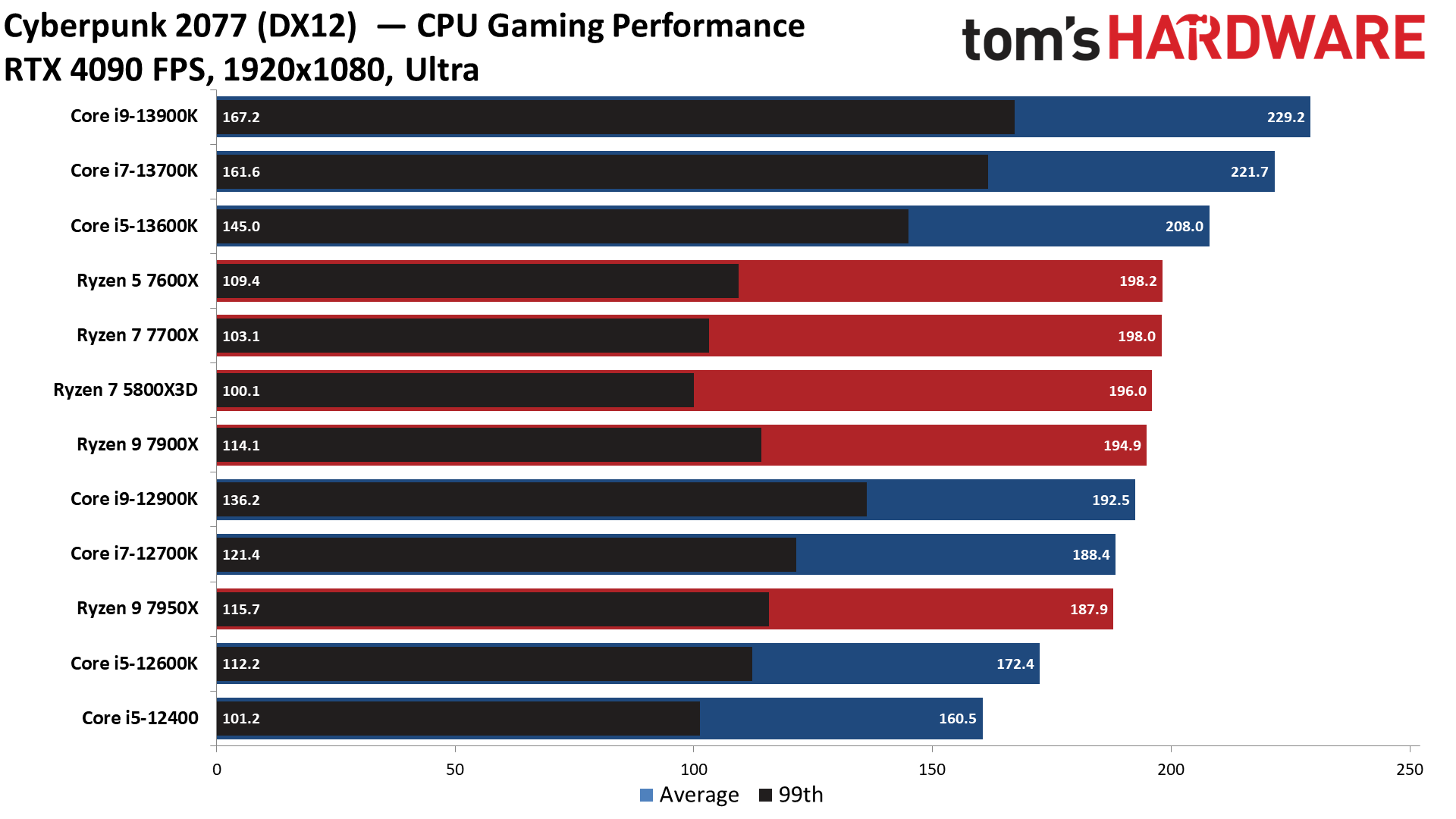
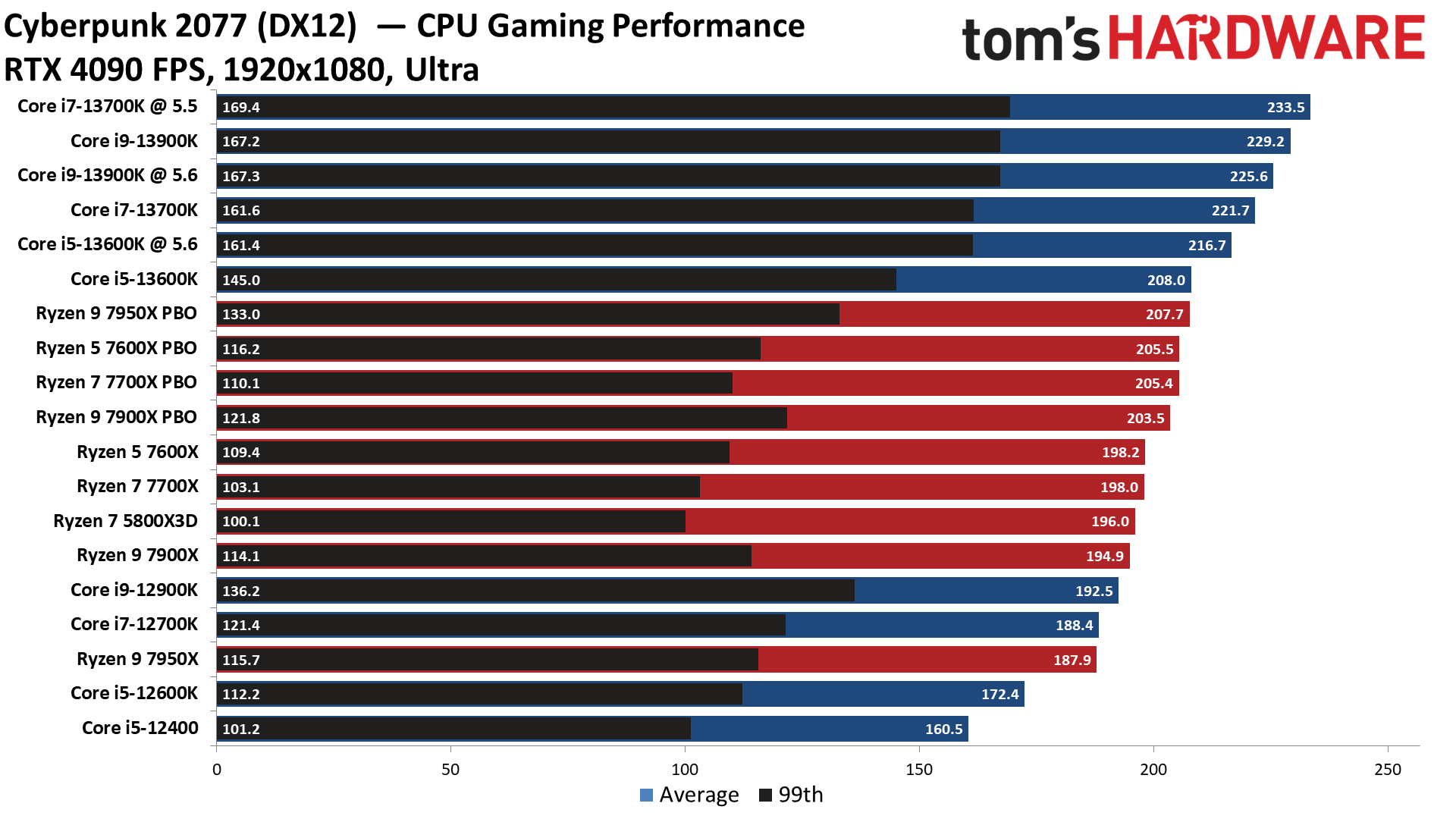
Cyberpunk 2077 finds the Intel processors taking the lead over the Ryzen 7000 models, but you'll notice that the dual-CCD Ryzen 9 7950X and 7900X trail the single-CCD Ryzen 5 and 7 models, implying this game could use some optimization. For now, the Core i5-13600K is 5% faster than the fastest AMD chip, while the Core i7-13700K and Core i9-13900K lead by 12% and 16%, respectively.
The second chart includes the overclocked configurations, and here we can see the Intel processors expand on their lead. Notably, the overclocked Core i9-13900K actually regresses compared to the stock config — that's because the 5.6 GHz all-core overclock isn't as fast as the 5.8 GHz boost speed. Surprisingly, the overclocked Core i7-13700K still carves out the win, possibly due to having fewer active e-cores.
Far Cry 6 on Intel Core i9-13900K and Core i5-13600K
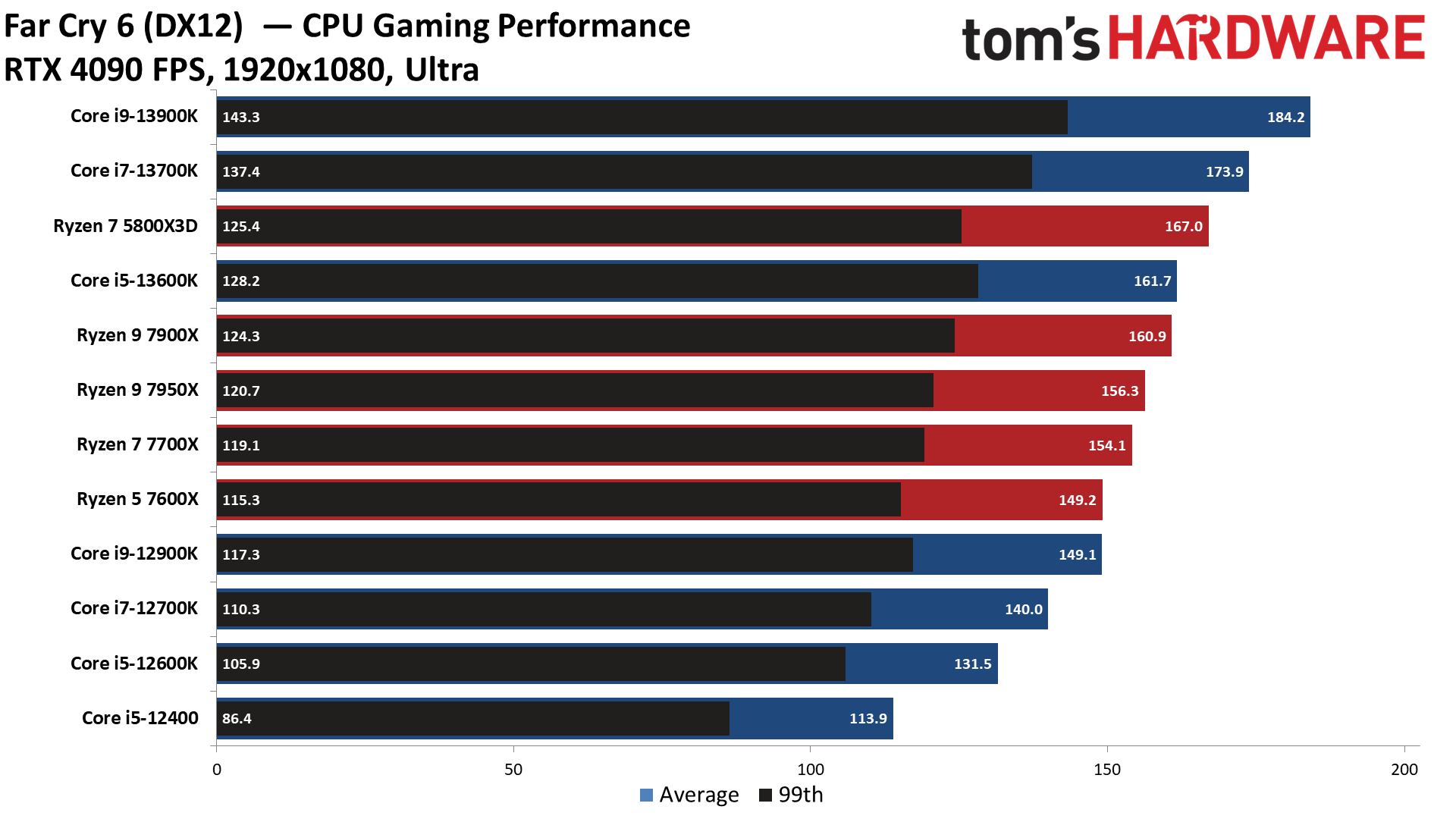
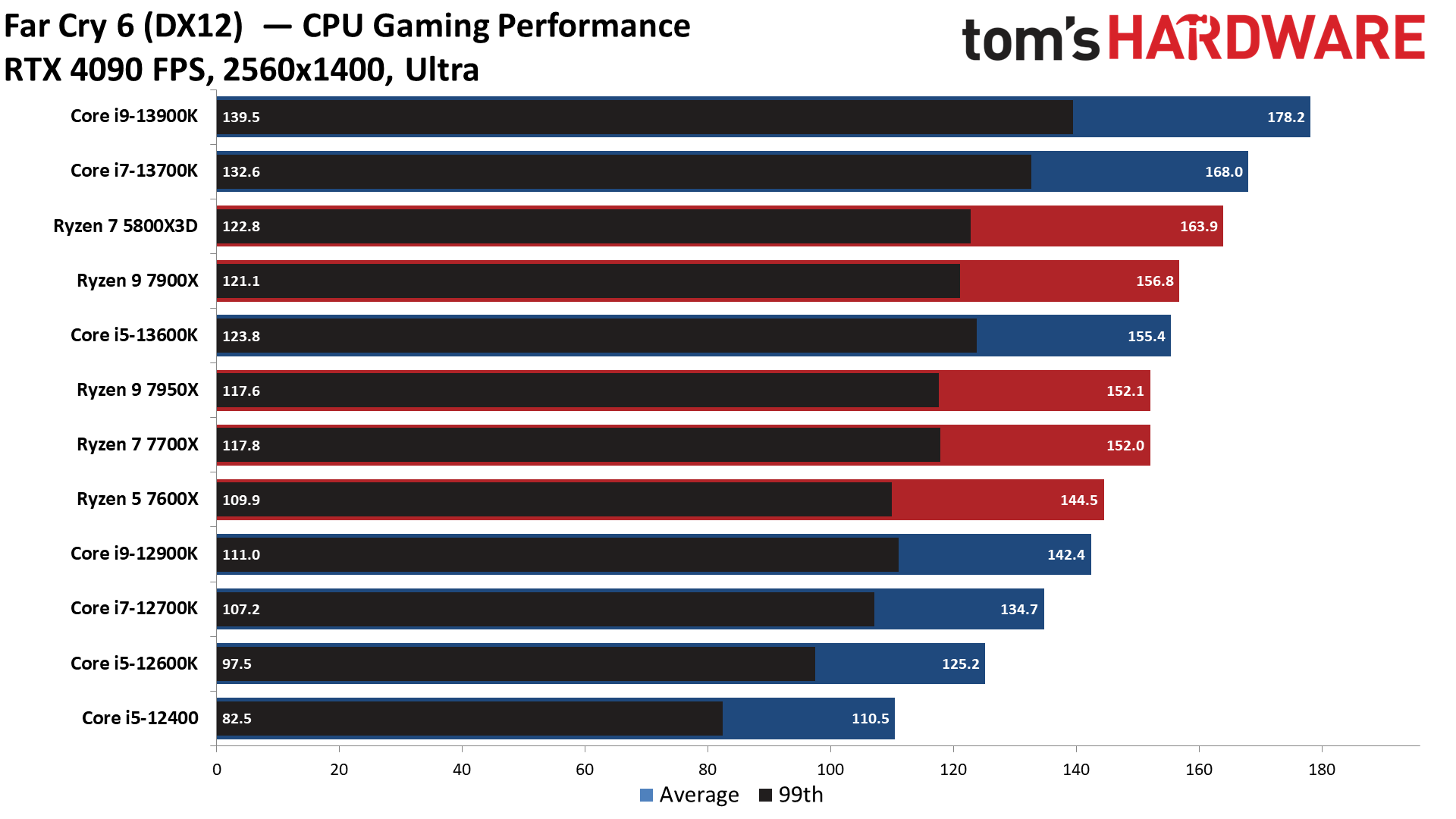
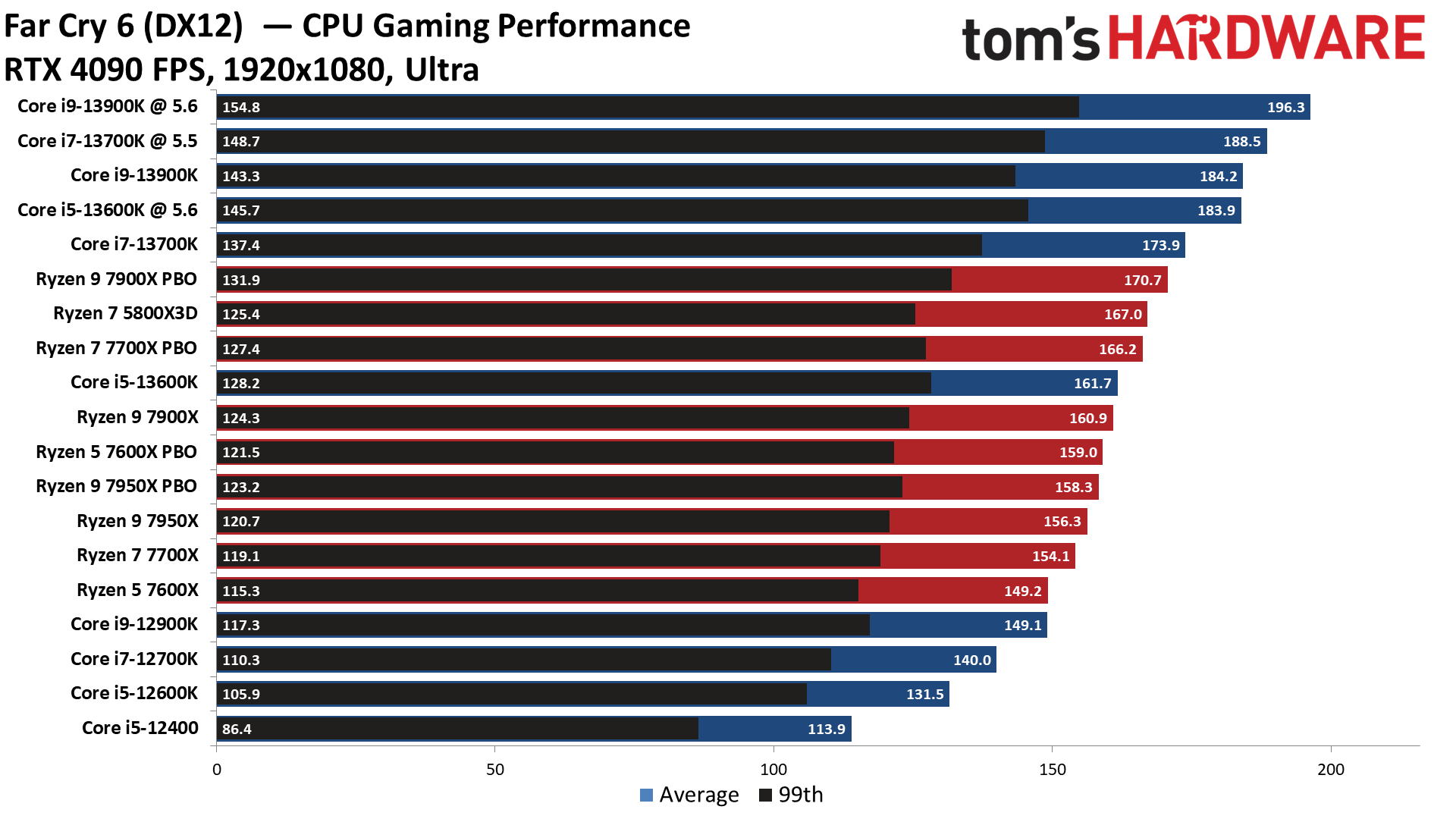
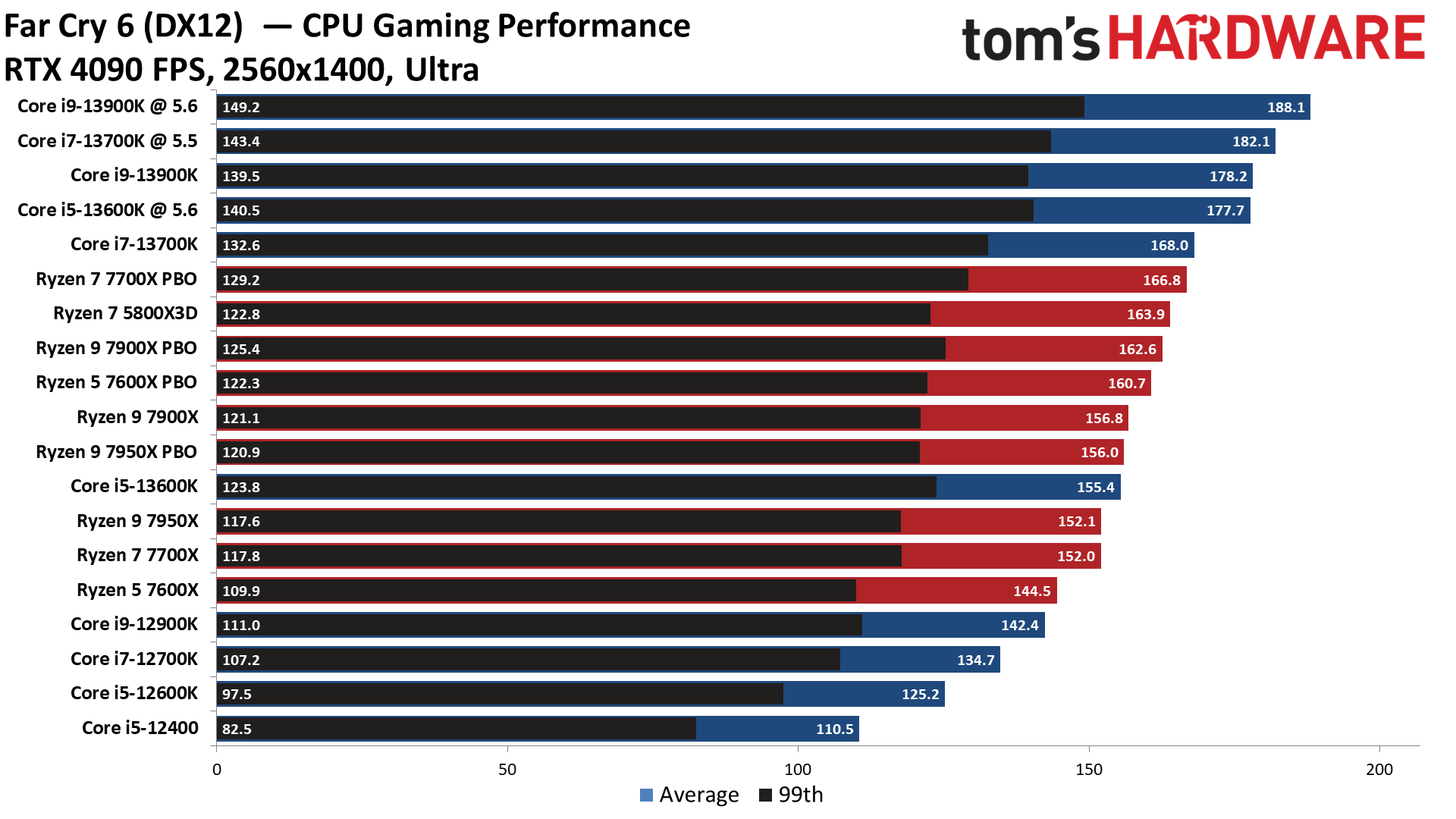
Far Cry 6 finds the Ryzen chips falling into a bit of a more predictable pecking order, but they still trail the Raptor Lake chips by significant margins at every price point. The Core i5-13600K continues to impress given its price tag, and it is simply stellar after overclocking.
F1 2021 on Intel Core i9-13900K and Core i5-13600K
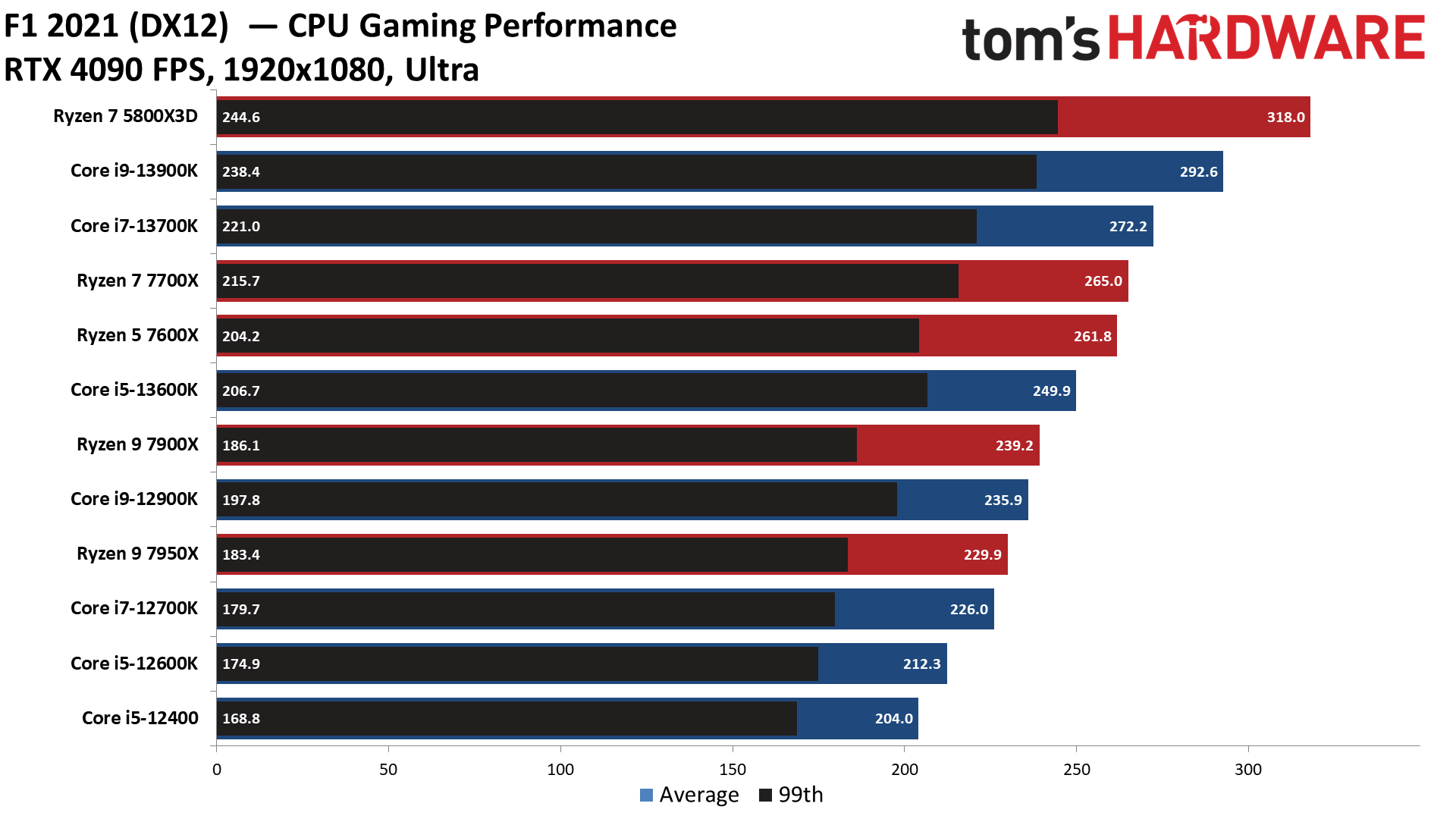
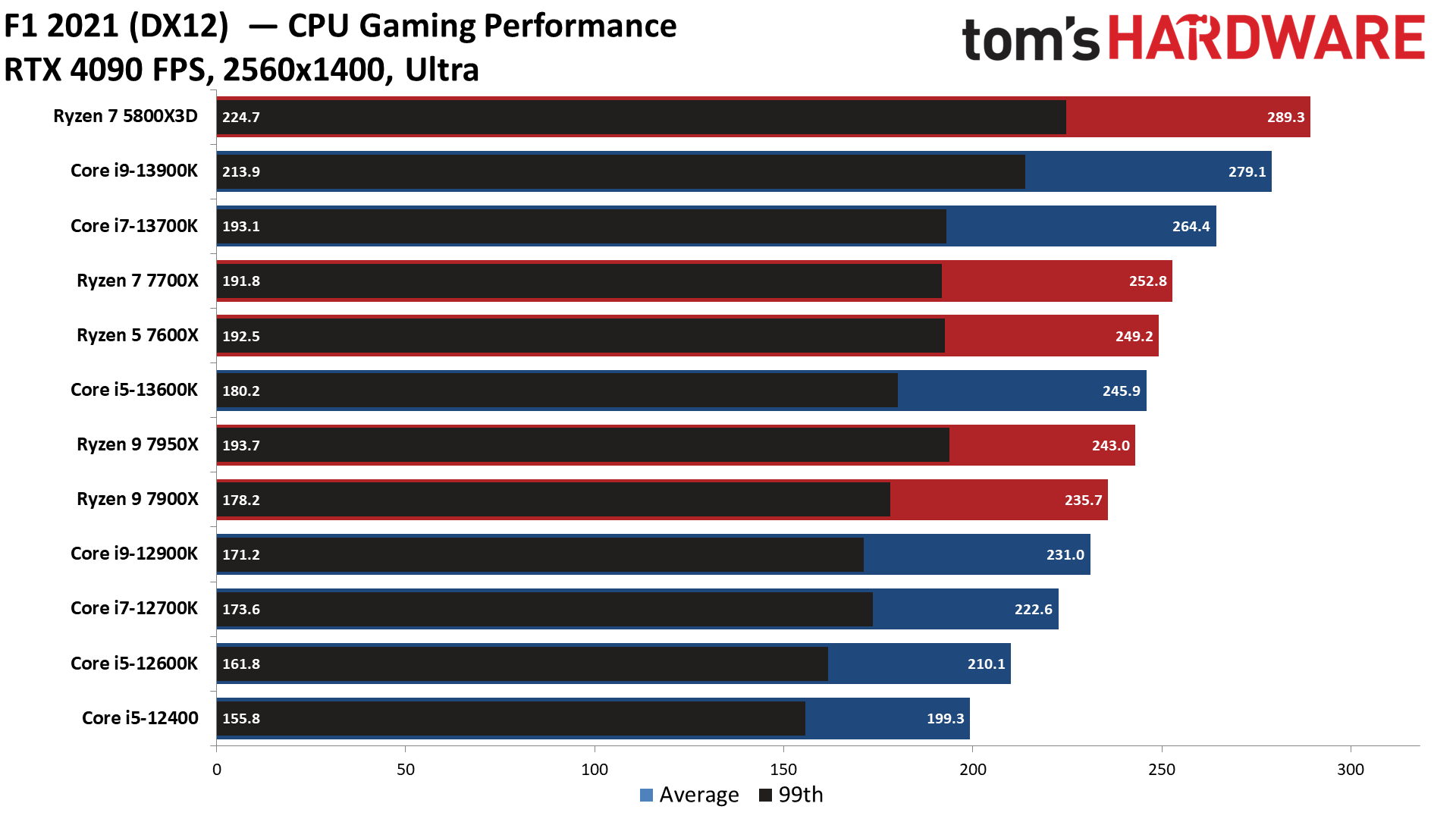
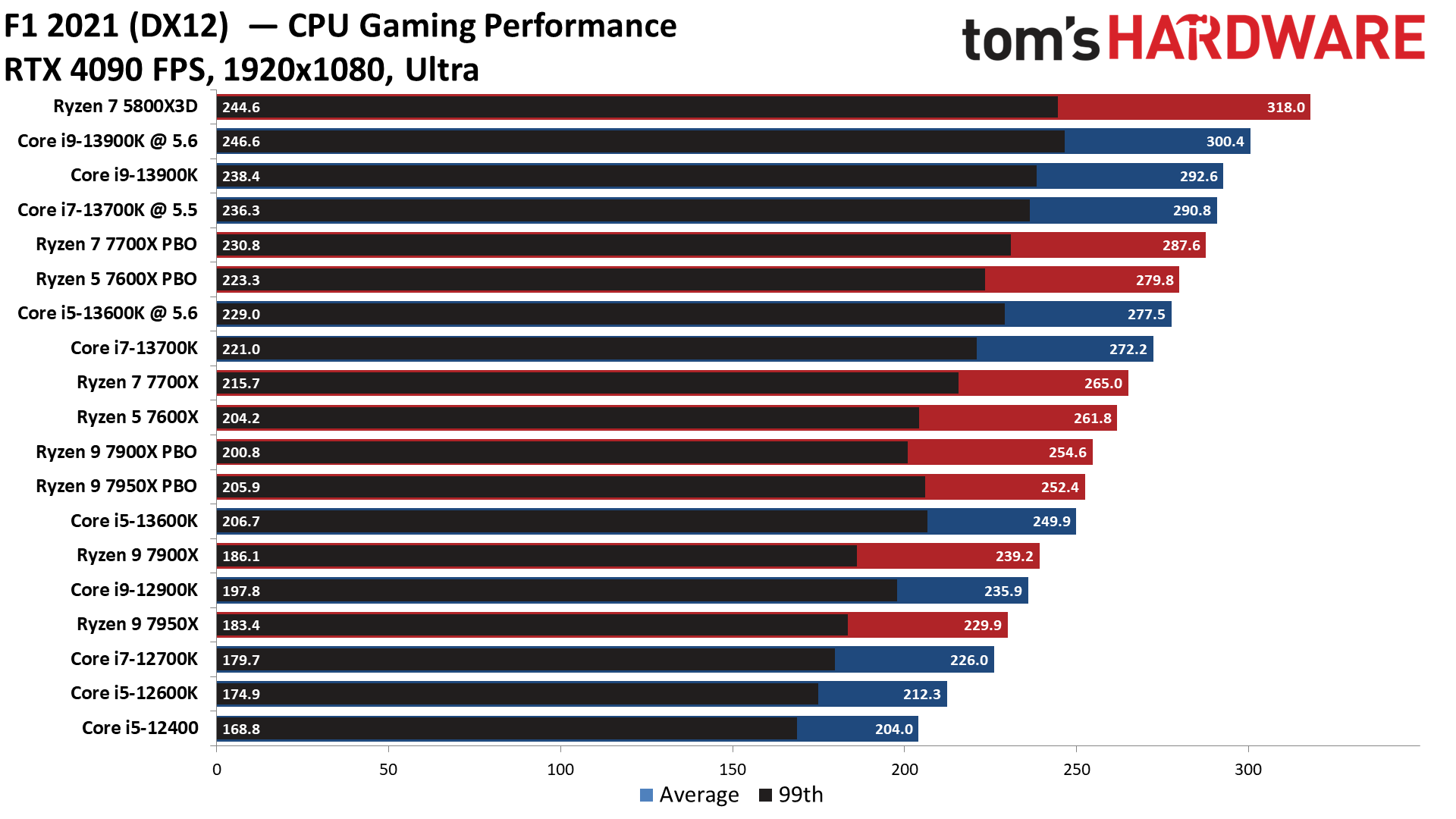
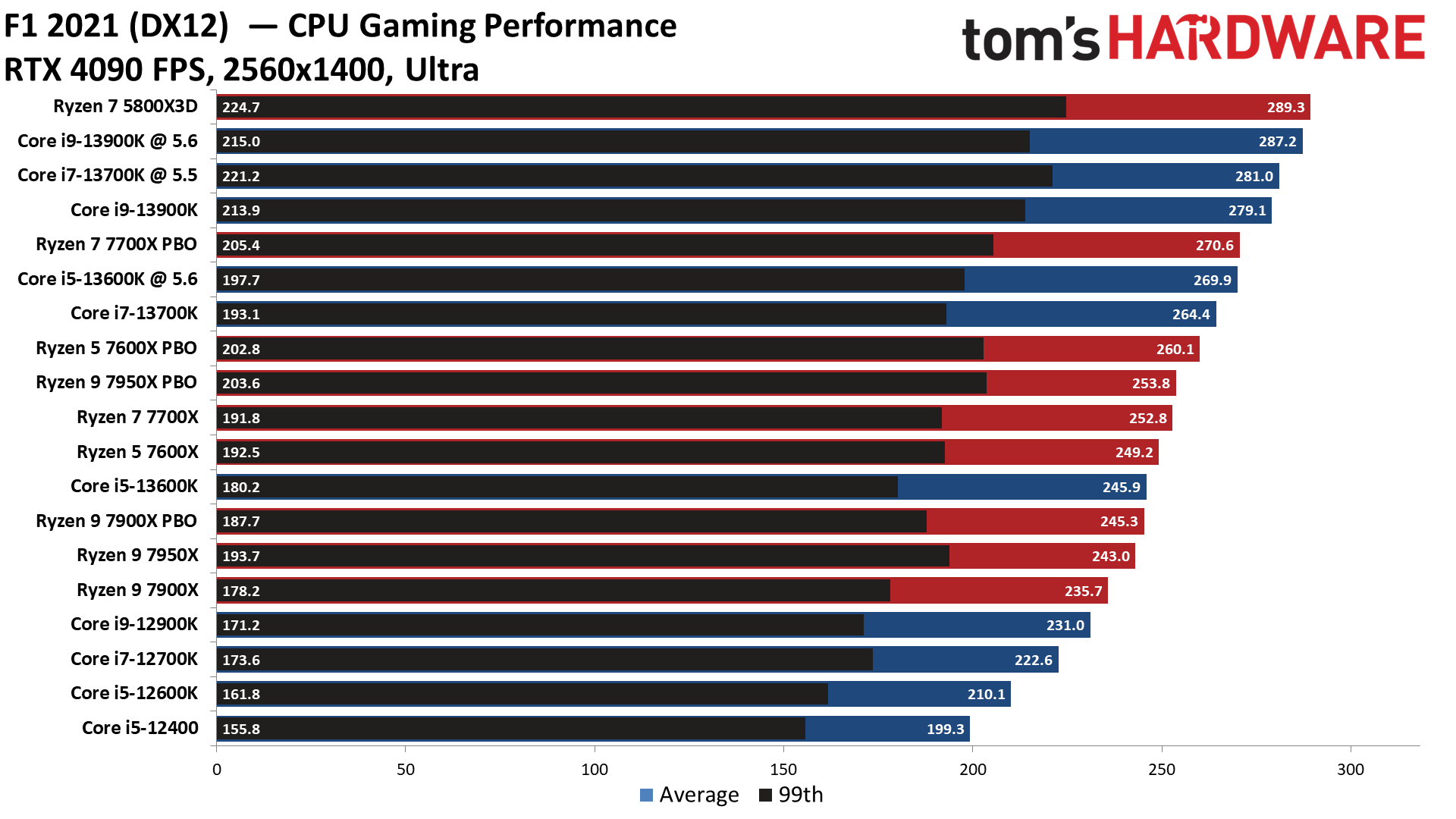
F1 2021 finds the Ryzen 9 models again trailing the Ryzen 7 and 5 models significantly. This title tends to scale by core count, so any optimization here could yield big gains for AMD's core-heavy chips.
The Ryzen 7 5800X3D reminds us of the power of its incredible 96MB of L3 cache here — despite its much lower 4.5 GHz clock rate, it is still 9% faster than the Core i9-13900K, and overclocking the latter does little to close the gap.
Hitman 3 on Intel Core i9-13900K and Core i5-13600K
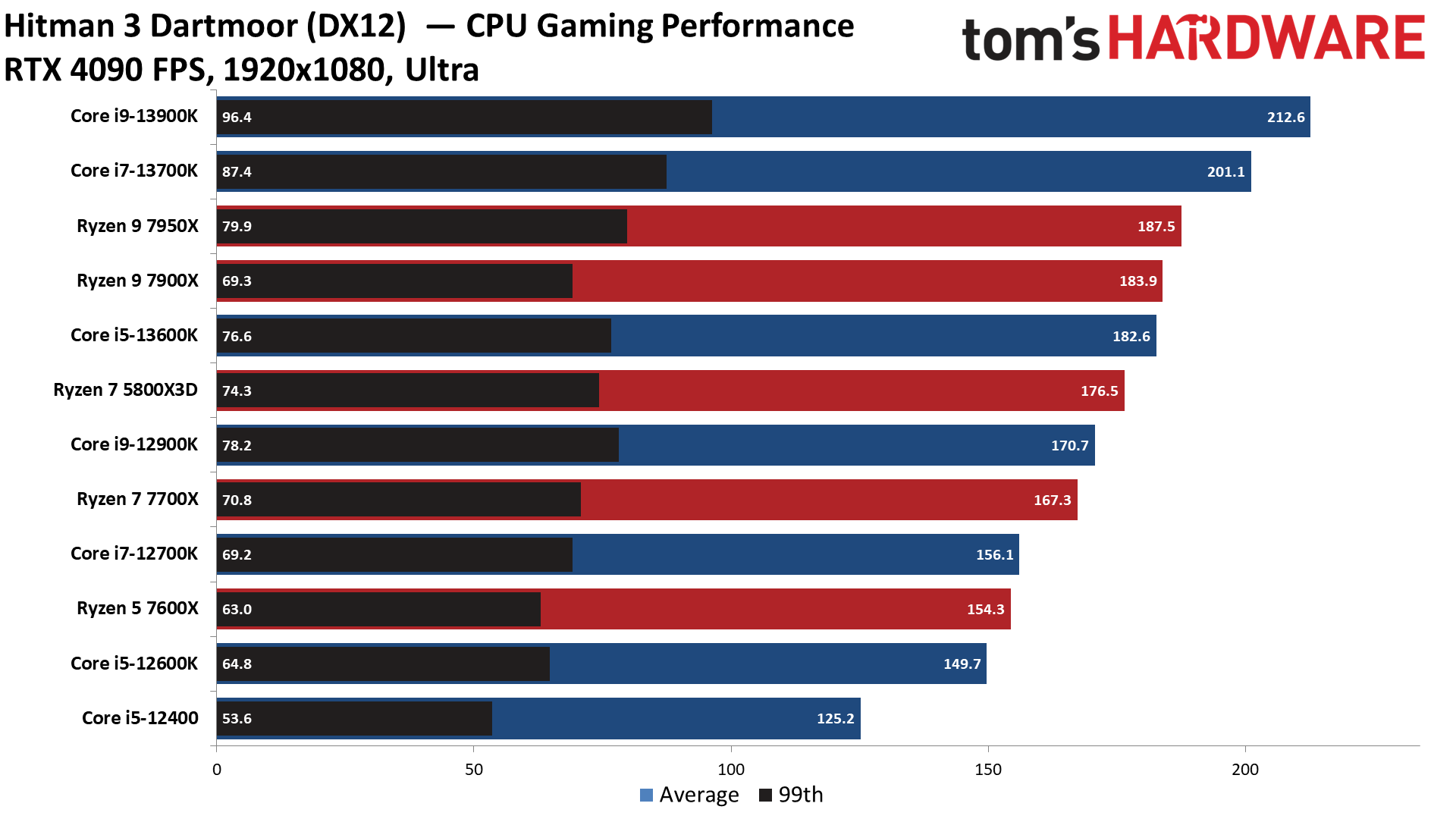
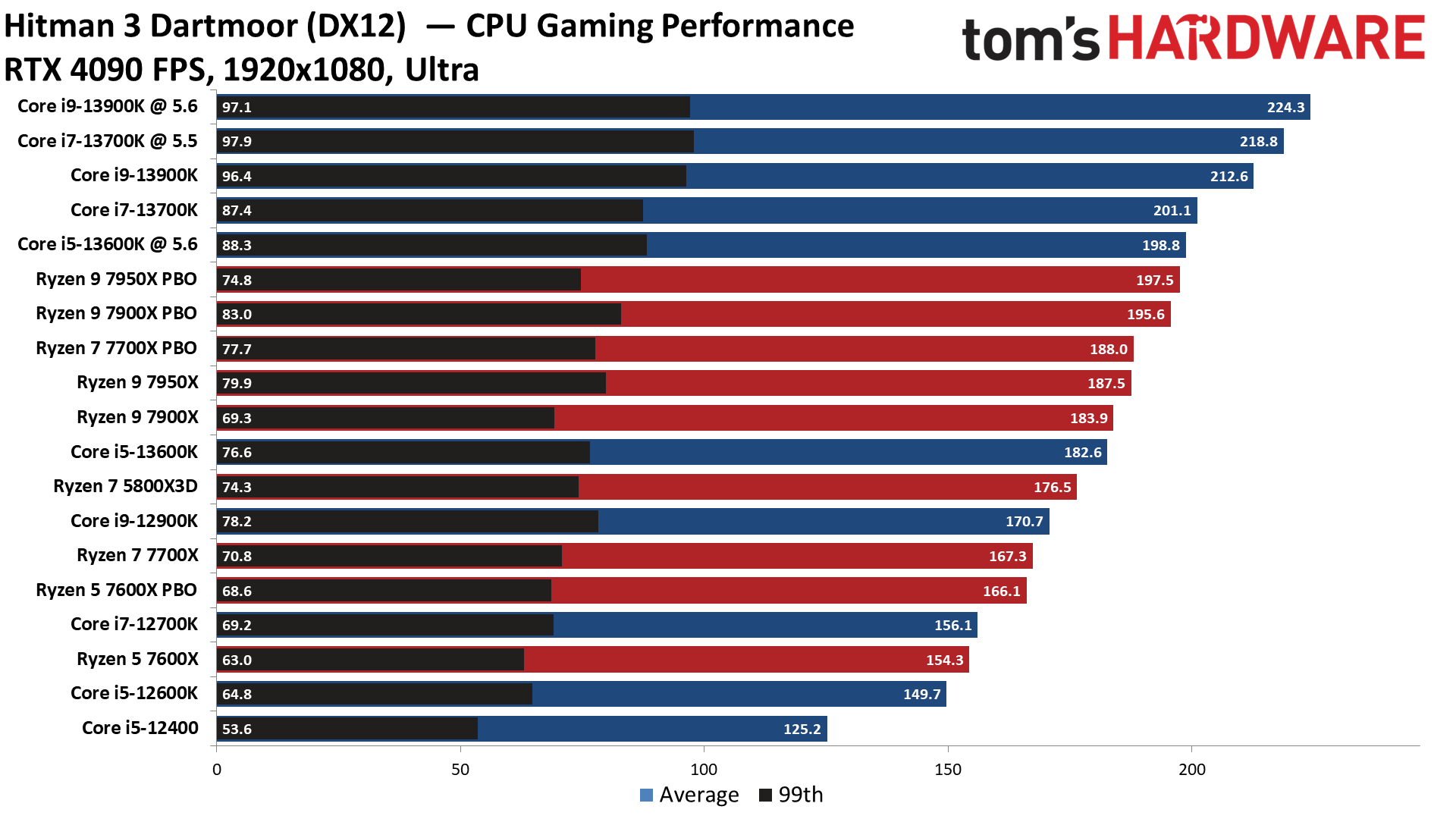
Hitman 3 finds the Ryzen 7000 processors scaling in a more predictable manner based on core count, but the Raptor Lake chips maintain a solid lead at their respective price points. Flipping over to the 1440p charts shows us that higher resolutions are often the great equalizer that levels the playing field for chips with similar accommodations.
Microsoft Flight Simulator 2021 on Intel Core i9-13900K and Core i5-13600K
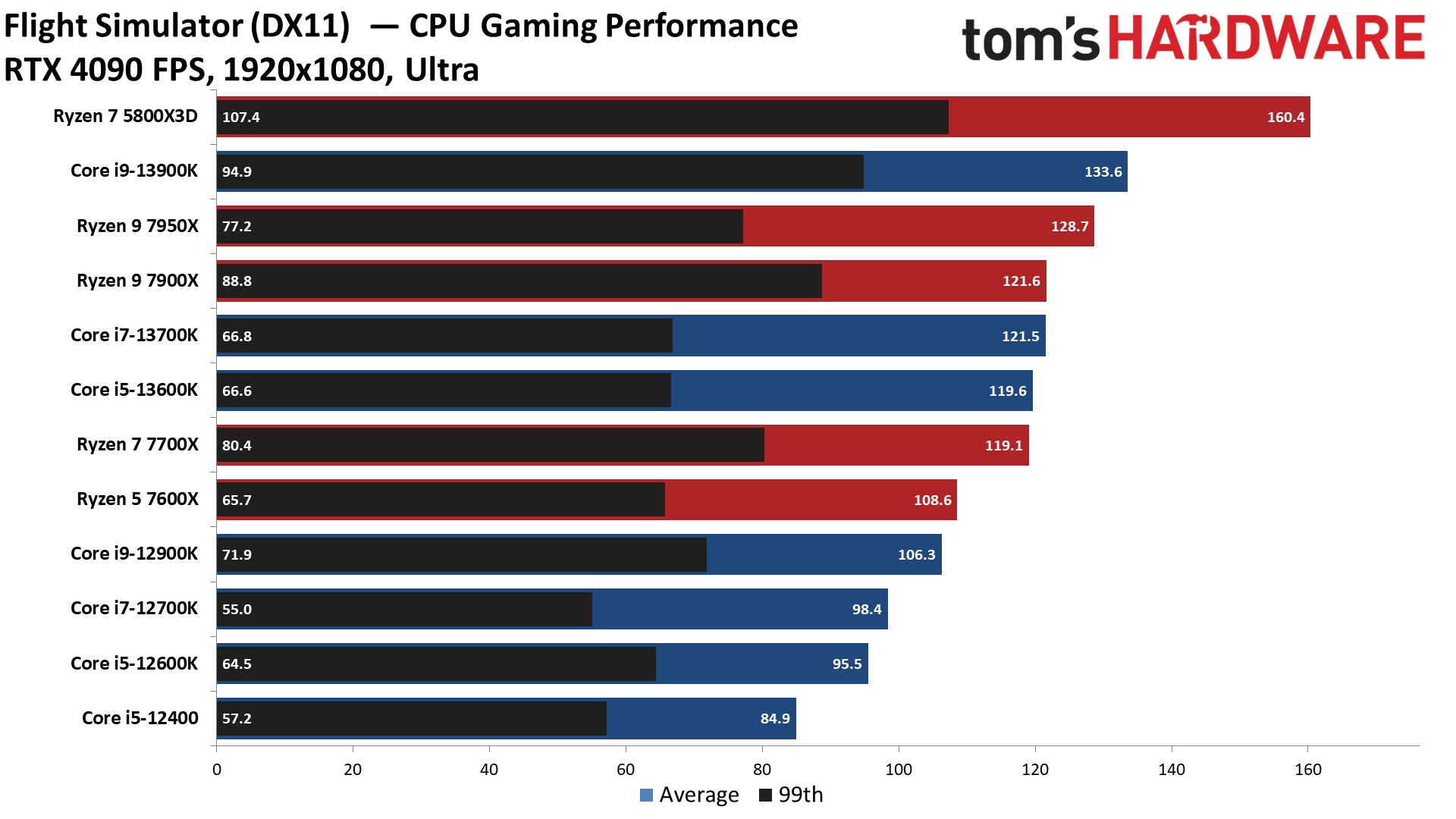
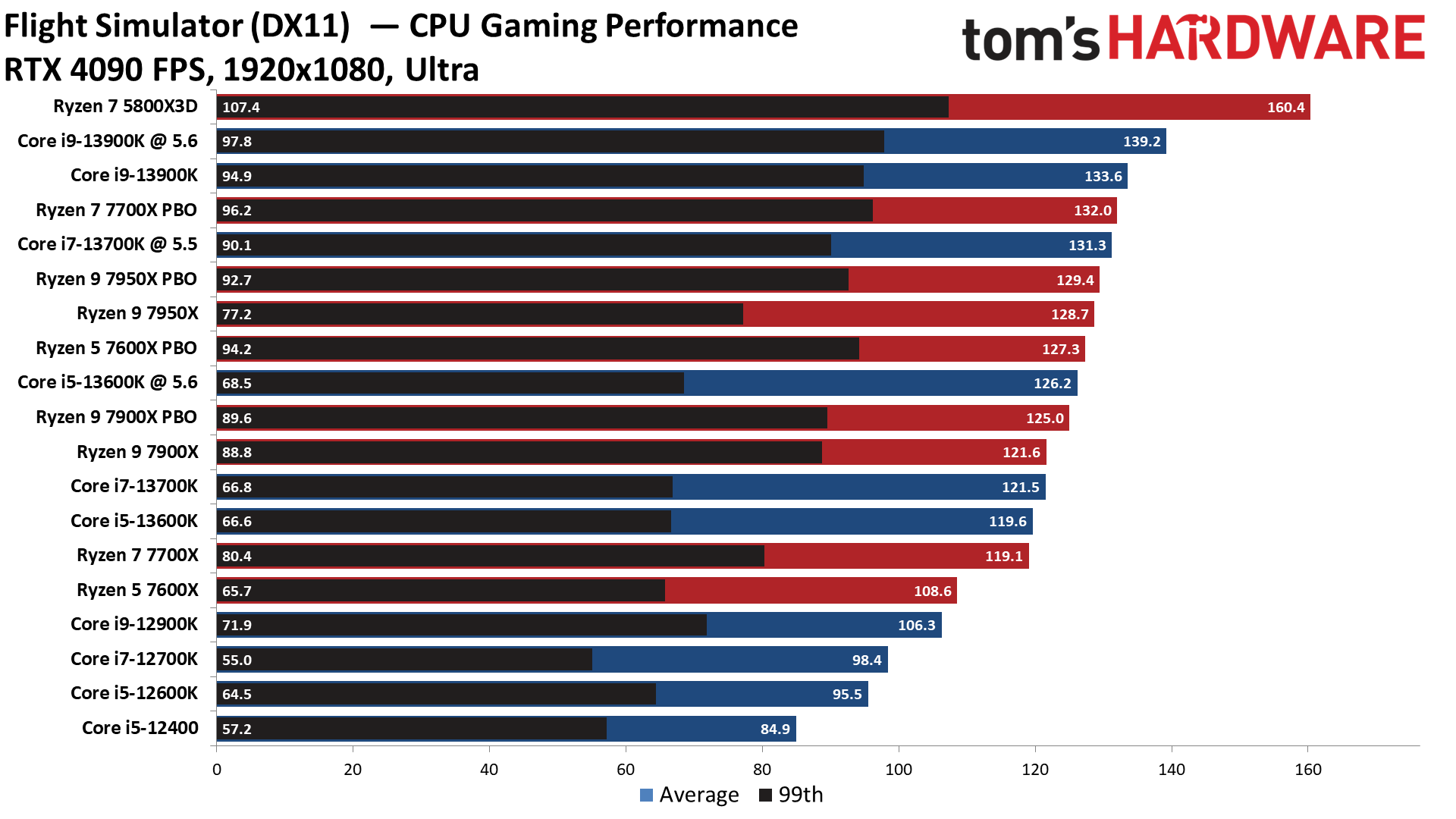
L3 cache obviously reigns supreme here as the Ryzen 7 5800X3D is an incredible 20% faster than the Core i9-13900K. Here we see some odd performance trends with Ryzen 7000 processors once again, with the Ryzen 9 7900X inexplicably trailing the other chips regardless of how many times we retested. This suggests some game code tuning could be in order.
Get Tom's Hardware's best news and in-depth reviews, straight to your inbox.
Red Dead Redemption 2 on Intel Core i9-13900K and Core i5-13600K
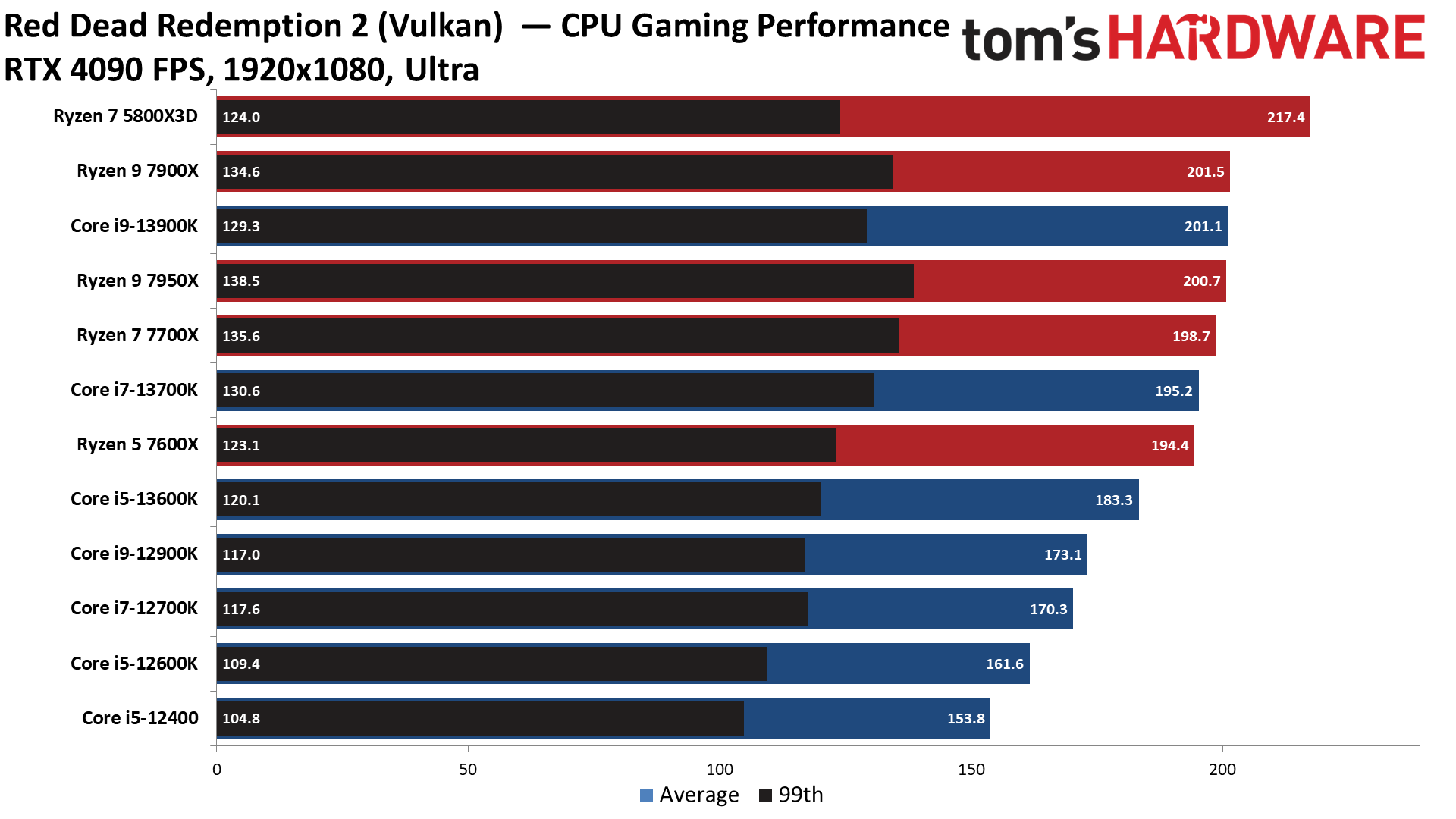
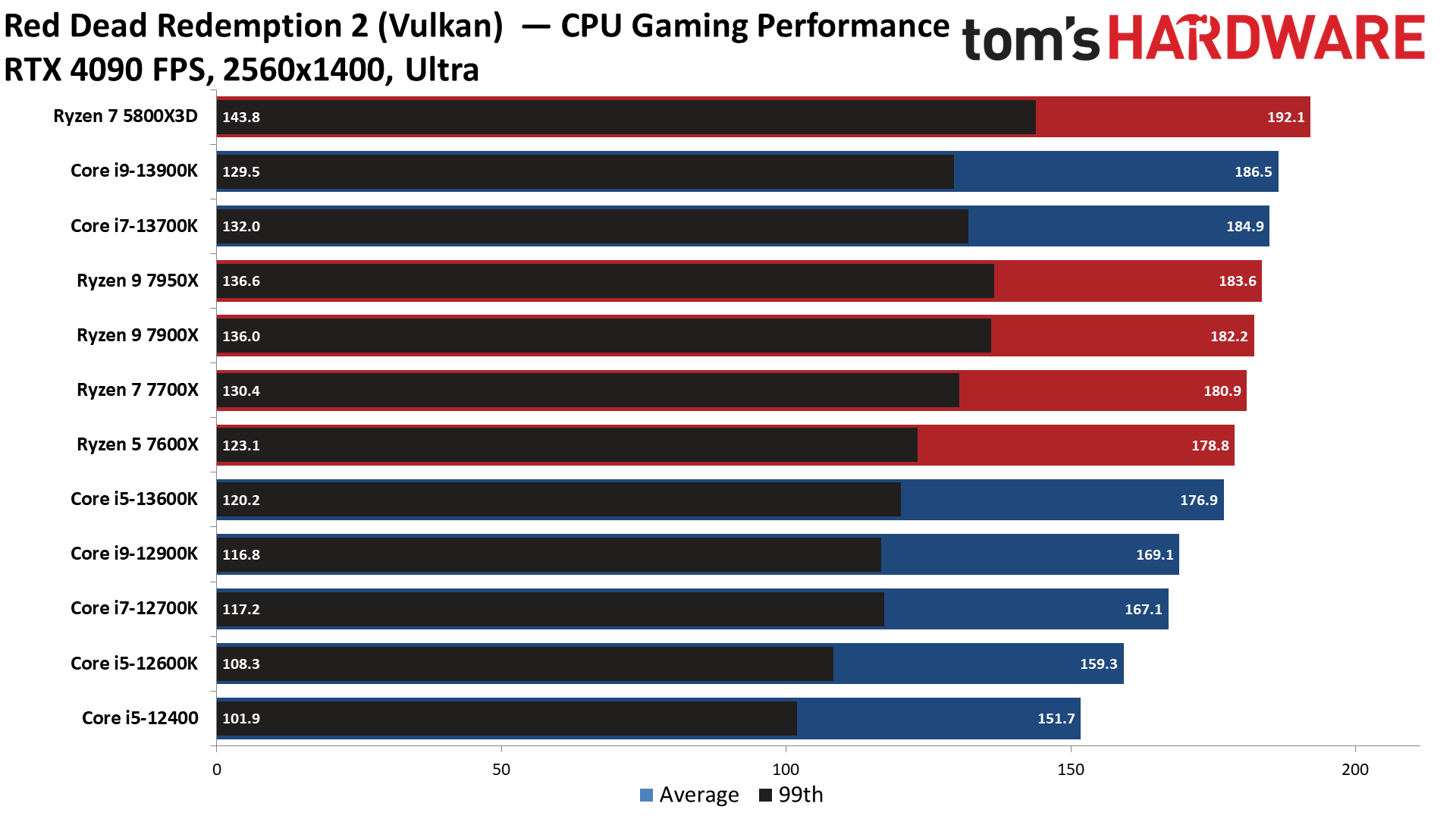
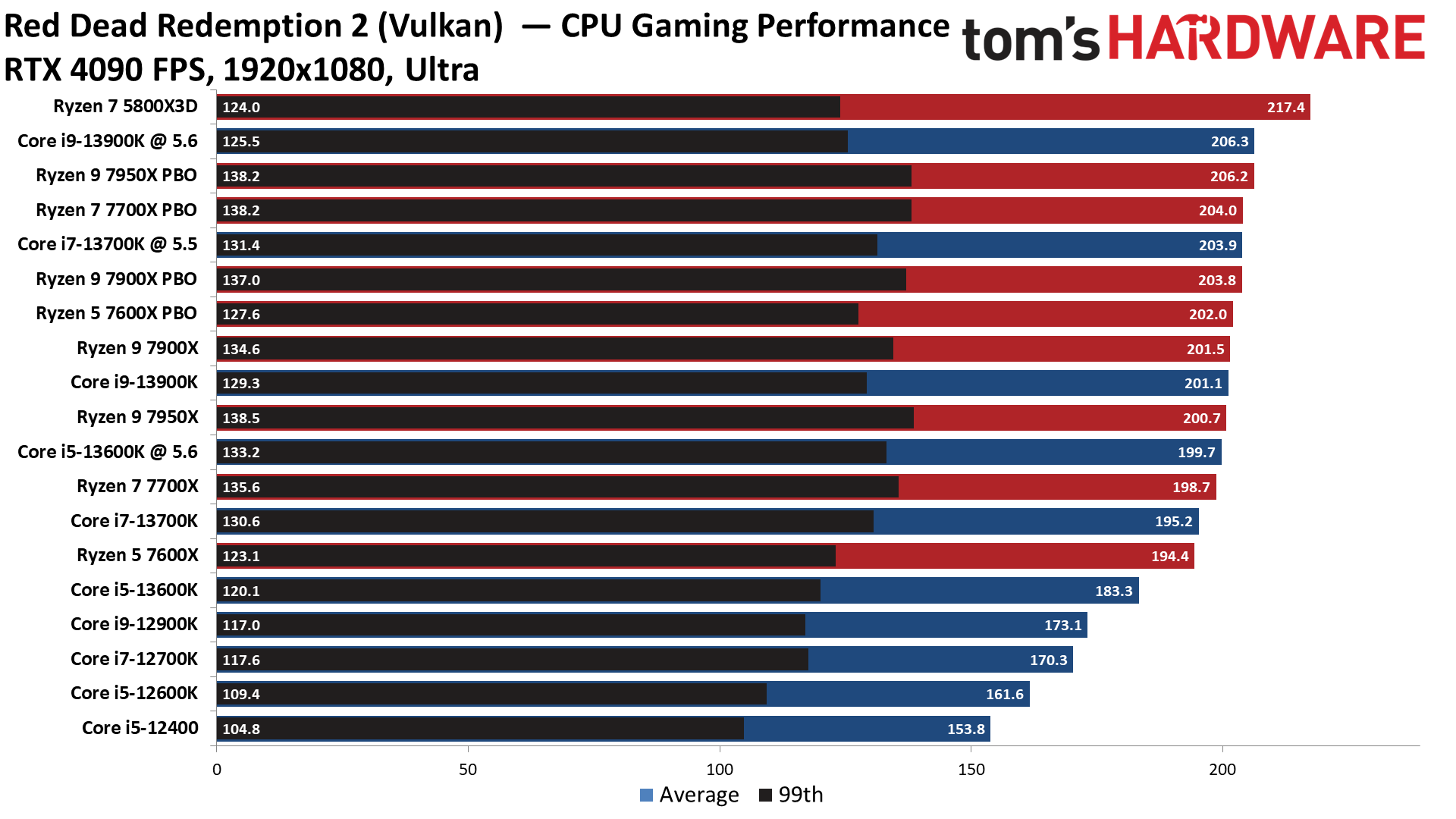
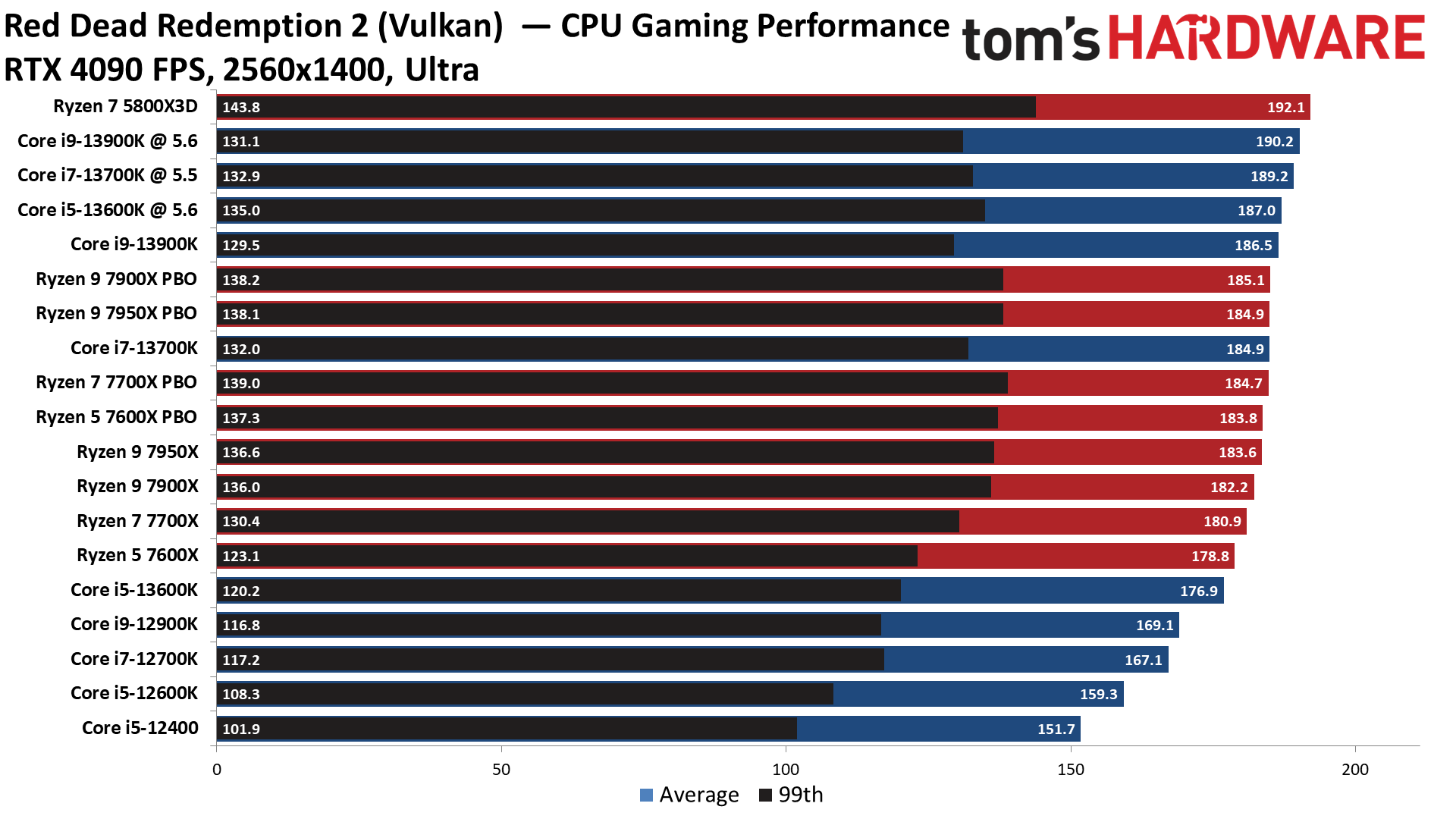
Even though they were leaders in gaming performance just a few months ago, the Alder Lake chips now wallow at the bottom of the chart, perhaps justifying a gen-on-gen update, a rarity, if you're after the best performance from an Intel chip.
Meanwhile, the Ryzen 7 5800X3D once again exhibits its inconsistent performance traits as it takes a sizeable lead in this title.
Warhammer 3 on Intel Core i9-13900K and Core i5-13600K
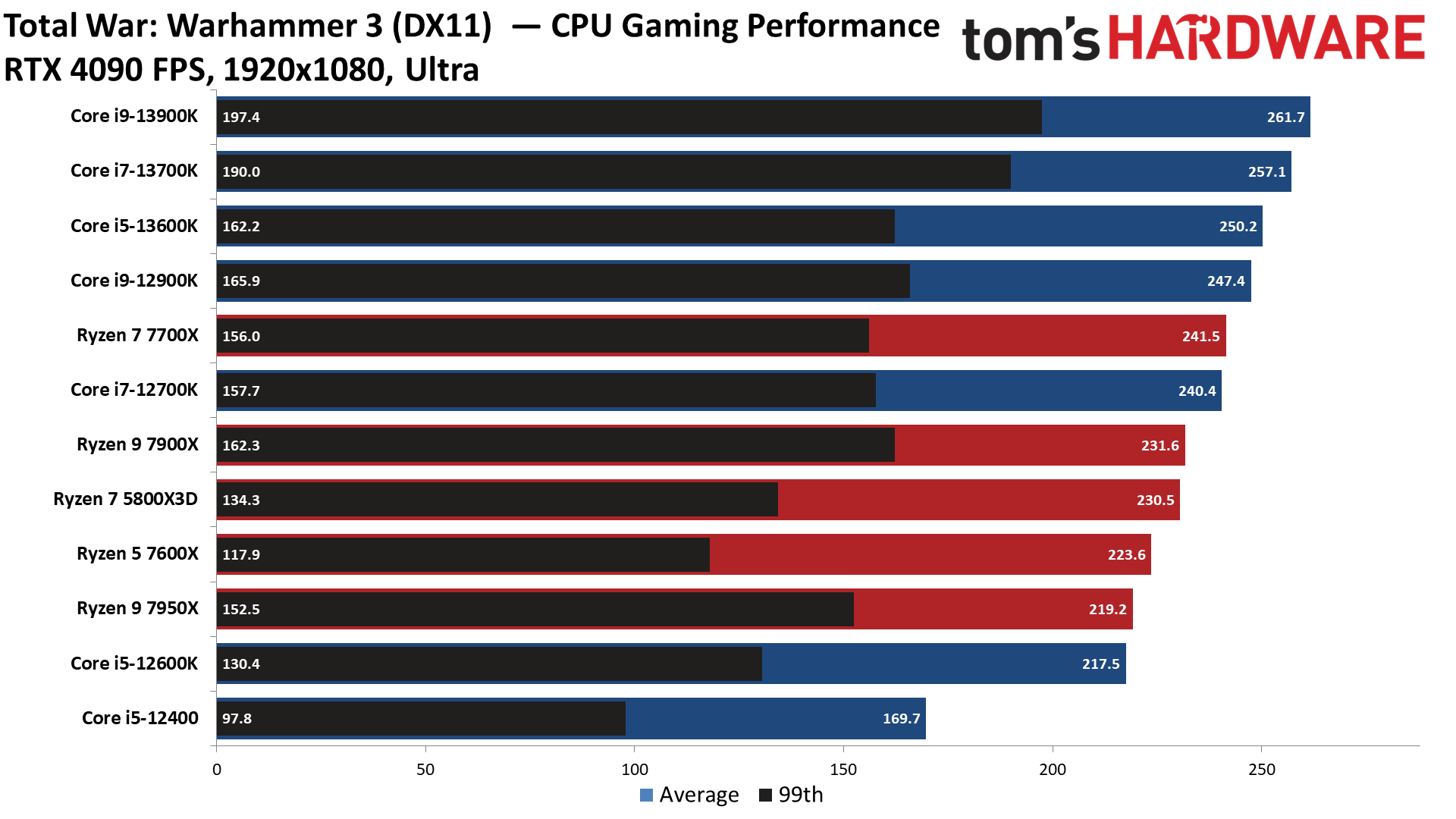
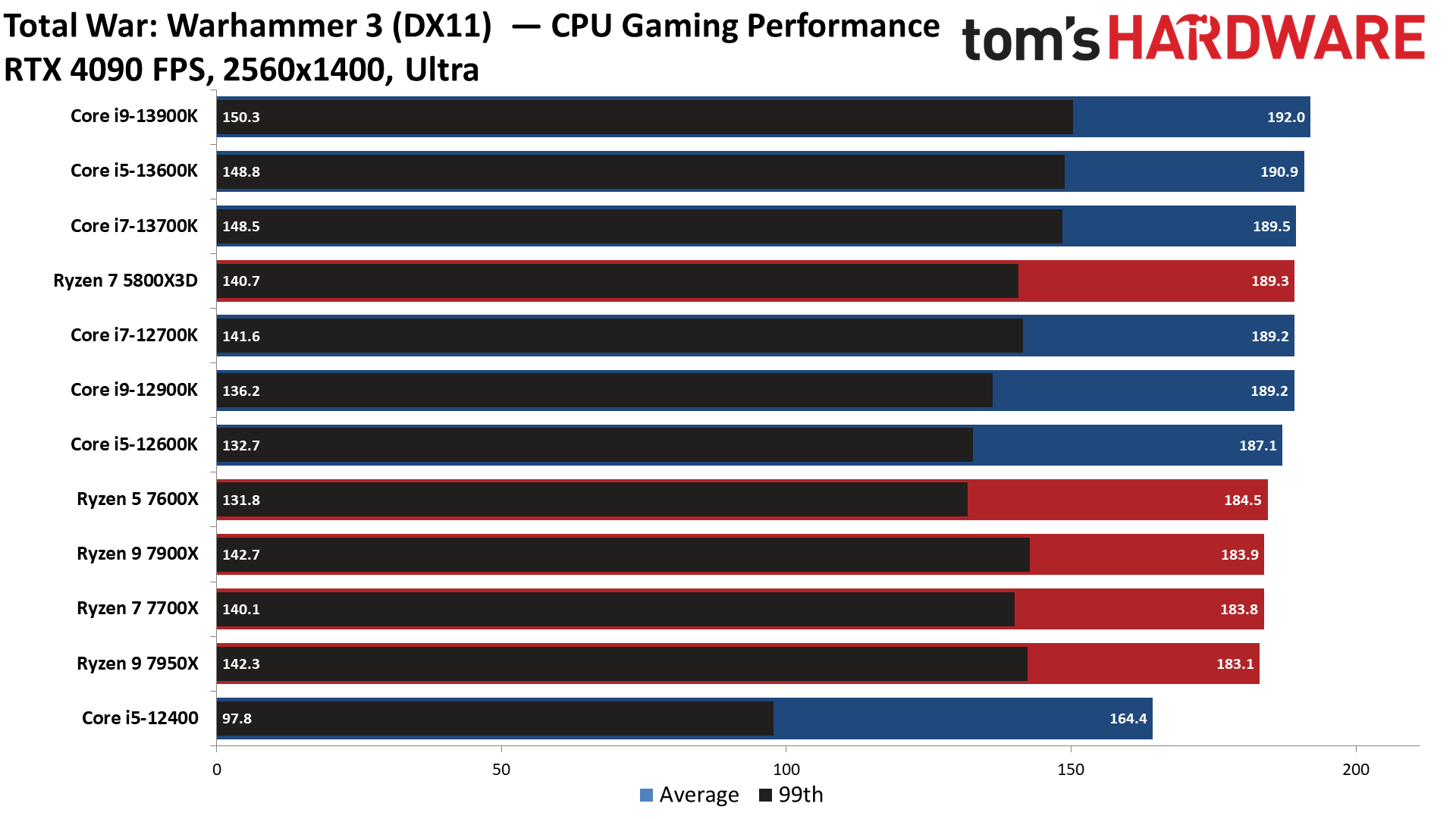
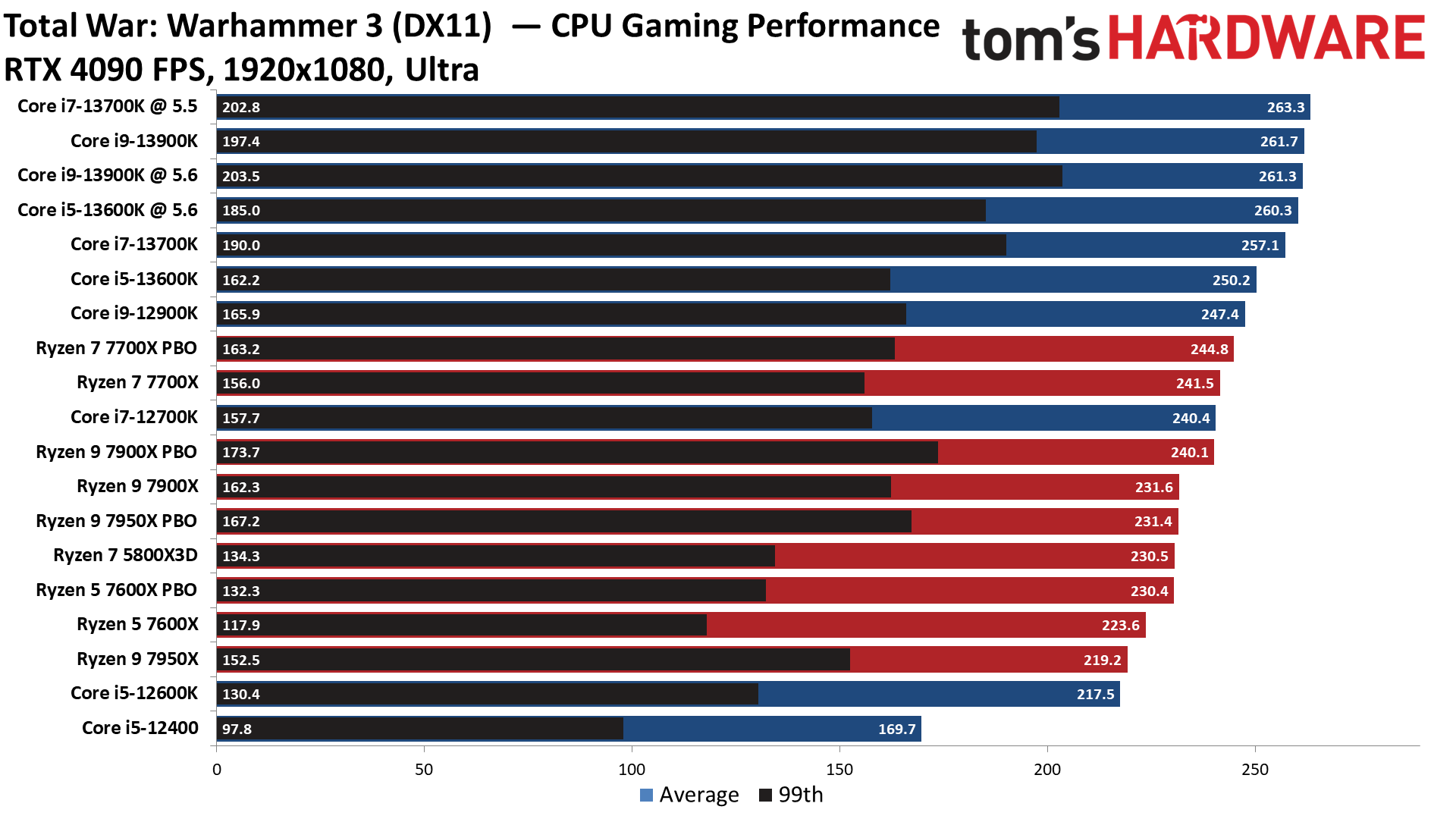
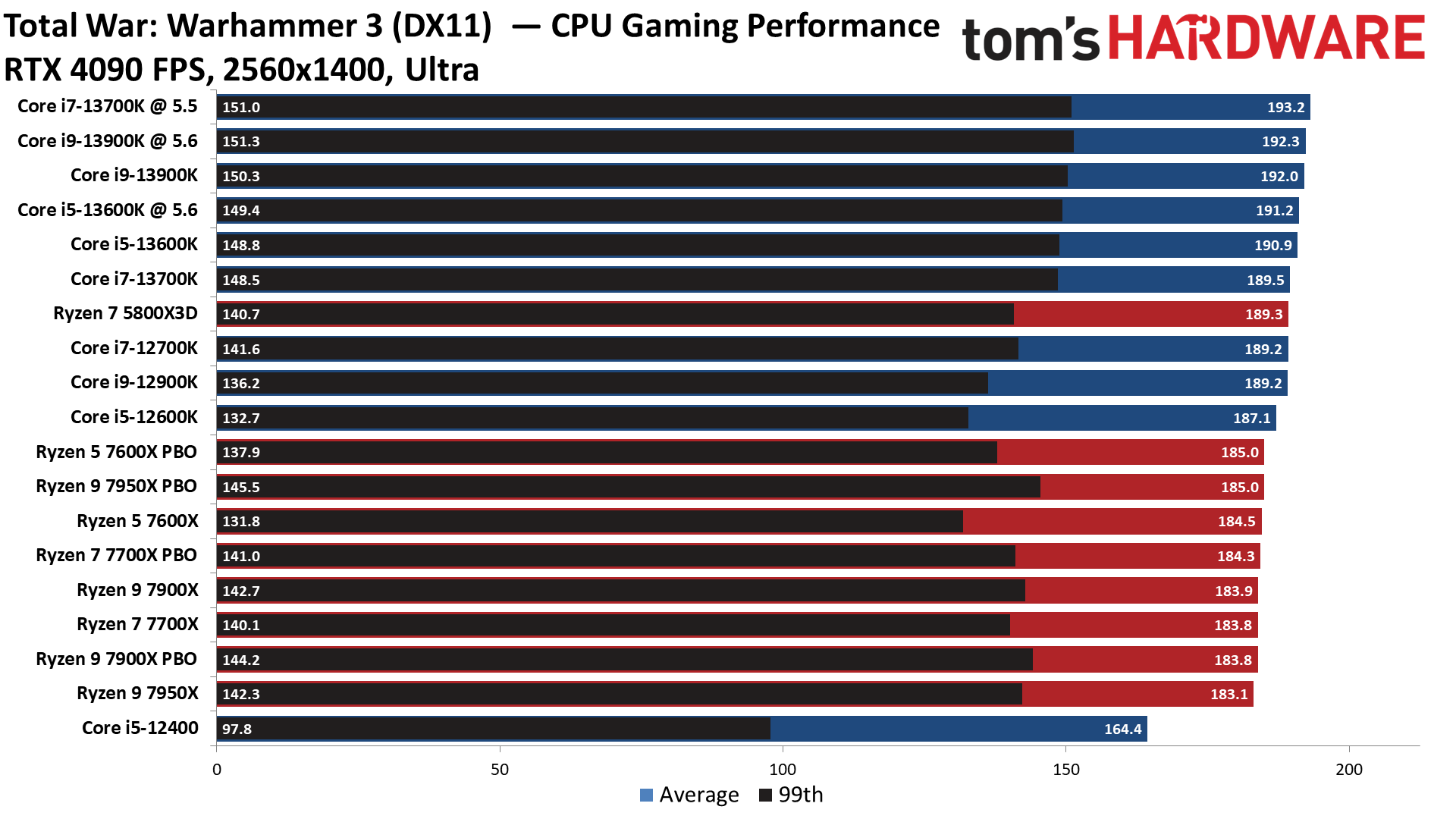
Flipping over to the 1440p charts shows us that higher resolutions are often the great equalizer that levels the playing field for chips with similar accommodations.
Watch Dogs Legion on Intel Core i9-13900K and Core i5-13600K
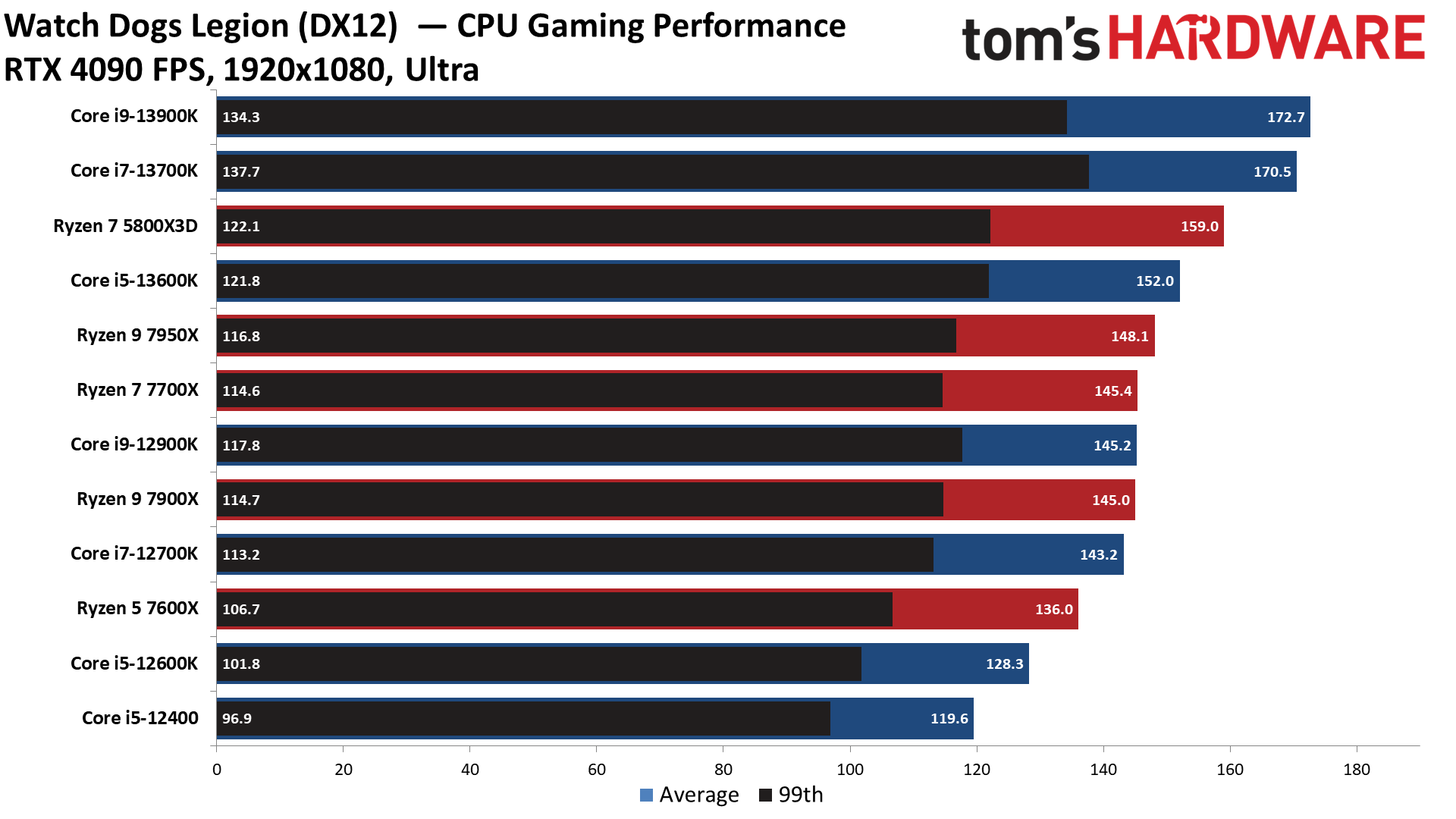
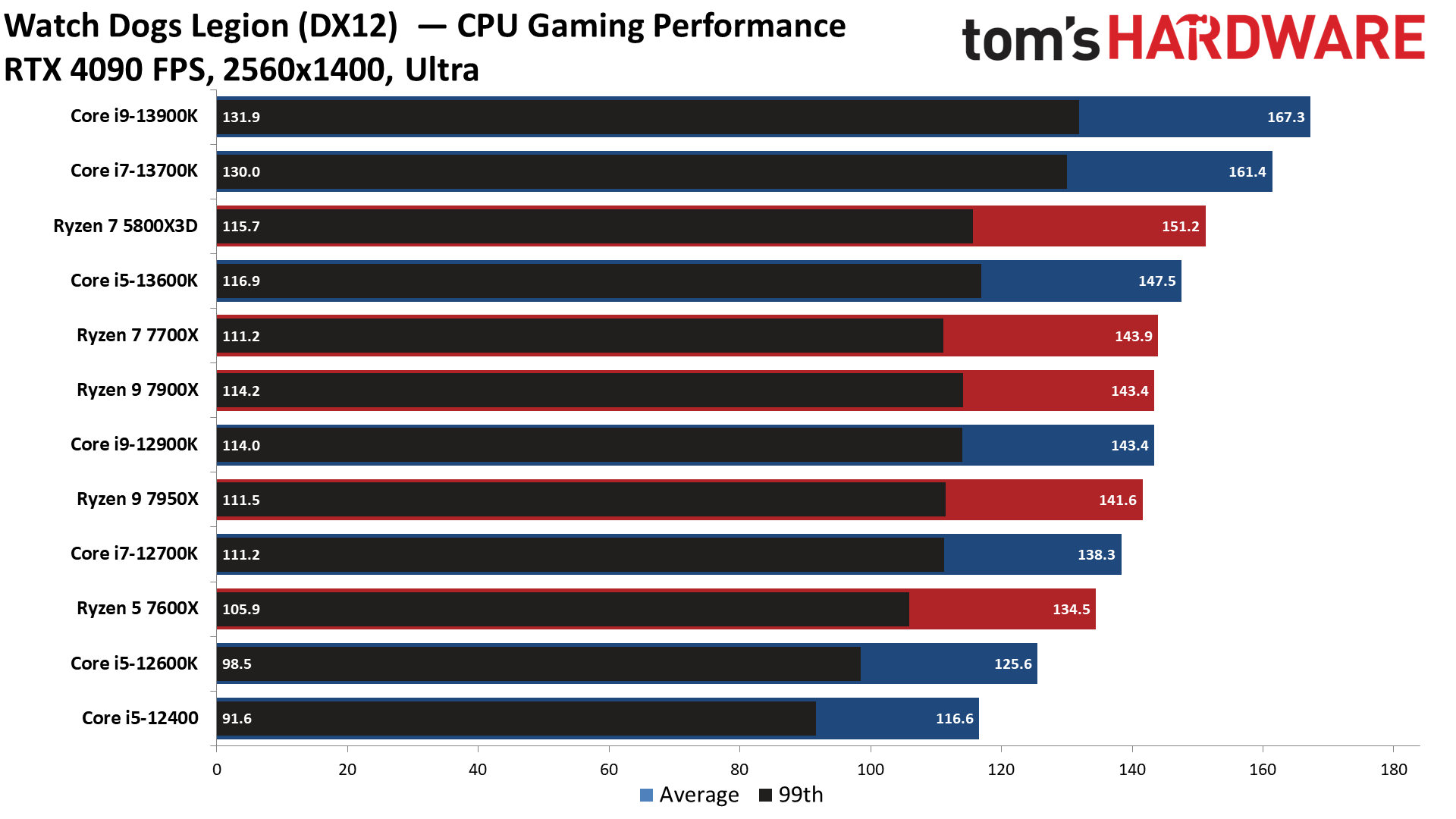
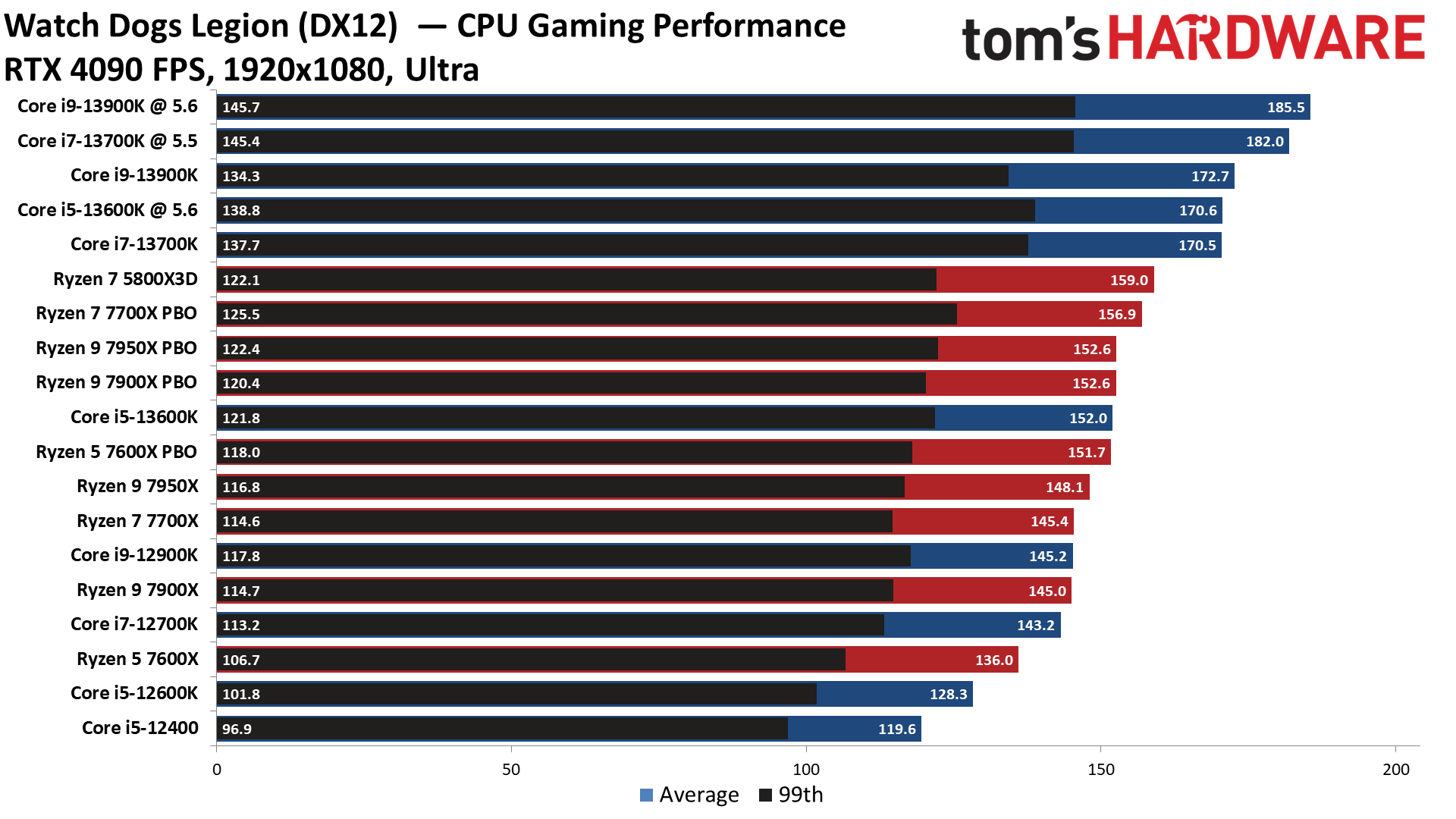
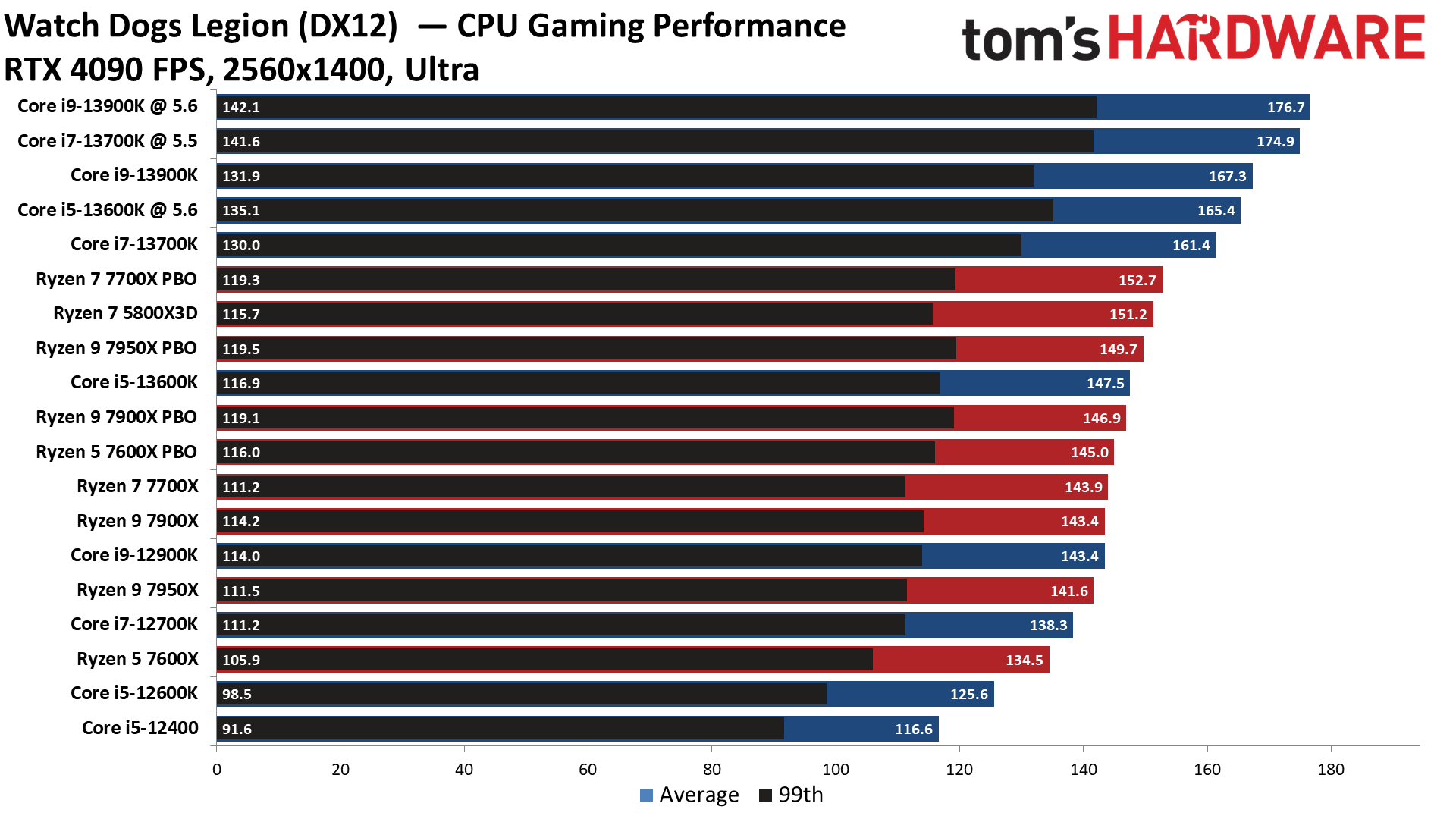
- MORE: AMD vs Intel
- MORE: Zen 4 Ryzen 7000 All We Know
- MORE: Raptor Lake All We Know
Current page: Gaming Benchmarks Intel Core i9-13900K and Core i5-13600K
Prev Page Power Consumption and Efficiency Core i9-13900K and Core i5-13600K Next Page Productivity Benchmarks on Core i9-13900K and Core i5-13600K
Paul Alcorn is the Editor-in-Chief for Tom's Hardware US. He also writes news and reviews on CPUs, storage, and enterprise hardware.
-
Maebius Great review peeps.Reply
Curious, will you test Raptor Lake with DDR4?
Also, aren't new-gen motherboard prices (for both AMD and Intel), kinda uhm, on the expensive side, even for entry level? -
johnnyboy5520 The Raptor Lake 13900K and AMD 7950X are pretty much equivalent. As for gaming, the 7000 X3d chips will bury Raptor Lake. AMDs mistake was keeping the same core count on the lower end SKUs which allowed Intel an easy win in productivity. Gaming is pretty much game dependent. I don't think AMD will make that same mistake going forward. They've got the superior architecture.Reply -
Why_Me Reply
The B760 boards and locked Intel cpu's are due for release this January.Maebius said:Great review peeps.
Curious, will you test Raptor Lake with DDR4?
Also, aren't new-gen motherboard prices (for both AMD and Intel), kinda uhm, on the expensive side, even for entry level? -
TerryLaze Reply
It wasn't a mistake from AMD, it was all they could do.johnnyboy5520 said:The Raptor Lake 13900K and AMD 7950X are pretty much equivalent. As for gaming, the 7000 X3d chips will bury Raptor Lake. AMDs mistake was keeping the same core count on the lower end SKUs which allowed Intel an easy win in productivity. Gaming is pretty much game dependent. I don't think AMD will make that same mistake going forward. They've got the superior architecture.
There are only so many combinations of their CCX they can do.
To increase their core counts on the lower CPUs they would have to add an CCX to them and come up with a way to add a third CCX to their 7950x.
That would mean that they would lose a big chunk of their margins or increase their prices by that amount, both of these options would be very bad for AMD.
If TSMC comes up with a good node shrink then AMD can increase the amount of cores per CCX for the next round, but then again the amount of cores is already ridiculous and only appeals to a very small amount of people. -
PCWarrior Reply
Not sure how you can claim that AMD has the superior architecture. All the IPC tests show that Raptor Cove P-Cores are ahead of Zen 4 in IPC. Also Intel’s hybrid approach is proving highly effective when it comes to heavily multithreaded workloads. The only thing that AMD has an advantage over Intel is in efficiency but that is only thanks to TSMC N5 (which is a full node ahead of Intel 7) and not due to some AMD microarchitectural design advantage. If anything, the very fact that Intel offers the same or superior performance despite being a full node behind is due to having a better architecture. Much like Nvidia’s RTX 3060 (on Samsung 8nm, an equivalent to a TSMC '10nm') versus Intel’s A770 (on TSMC 6nm).johnnyboy5520 said:The Raptor Lake 13900K and AMD 7950X are pretty much equivalent. As for gaming, the 7000 X3d chips will bury Raptor Lake. AMDs mistake was keeping the same core count on the lower end SKUs which allowed Intel an easy win in productivity. Gaming is pretty much game dependent. I don't think AMD will make that same mistake going forward. They've got the superior architecture. -
The Historical Fidelity Intel artificially hiding L2 cache on the alderlake chips is pretty sus to me. Another reason I am done with Intel. Anti-consumer behavior all day.Reply -
The Historical Fidelity Reply
You are absolutely wrong about efficiency, Zen is a much more power and area efficient architecture. Except for when they decide to go for the highest clock speeds possible on the process node they manufacture on. TSMC’s node designs are notoriously voltage hungry on the top of their operating speeds. Bring down the top speed by 2-300 MHz and the zen 4 7950x sips power at a 105 watt TDP (AMD ECO mode) similar to zen 3 power.PCWarrior said:Not sure how you can claim that AMD has the superior architecture. All the IPC tests show that Raptor Cove P-Cores are ahead of Zen 4 in IPC. Also Intel’s hybrid approach is proving highly effective when it comes to heavily multithreaded workloads. The only thing that AMD has an advantage over Intel is in efficiency but that is only thanks to TSMC N5 (which is a full node ahead of Intel 7) and not due to some AMD microarchitectural design advantage. If anything, the very fact that Intel offers the same or superior performance despite being a full node behind is due to having a better architecture. Much like Nvidia’s RTX 3060 (on Samsung 8nm, an equivalent to a TSMC '10nm') versus Intel’s A770 (on TSMC 6nm). -
TerryLaze Reply
On average the 7950x is about 3% faster in multi, (loses hard on single) and uses 20W less power.The Historical Fidelity said:You are absolutely wrong about efficiency, Zen is a much more power and area efficient architecture. Except for when they decide to go for the highest clock speeds possible on the process node they manufacture on. TSMC’s node designs are notoriously voltage hungry on the top of their operating speeds. Bring down the top speed by 2-300 MHz and the zen 4 7950x sips power at a 105 watt TDP (AMD ECO mode) similar to zen 3 power.
It is more efficient, but much more is hugely hyperbolic, it's so little most people won't even bother to call it a difference.
And you can reduce power draw on the 13900k as well and you only lose performance in a very few applications.You know which ones because all the "trusted reviewers" use exclusively those apps and nothing more.
https://www.pcwelt.de/article/1357334/core-i9-13900k-core-i5-13600k-im-test.html -
The Historical Fidelity ReplyTerryLaze said:On average the 7950x is about 3% faster in multi, (loses hard on single) and uses 20W less power.
It is more efficient, but much more is hugely hyperbolic, it's so little most people won't even bother to call it a difference.
And you can reduce power draw on the 13900k as well and you only lose performance in a very few applications.You know which ones because all the "trusted reviewers" use exclusively those apps and nothing more.
https://www.pcwelt.de/article/1357334/core-i9-13900k-core-i5-13600k-im-test.html
That is actually still very high power usage even with MCE off and PL1/2 adherence.
In a thorough review (reference below) of power efficiency we see:
the 7950x at 142 watts beating the 13900k at 142 watts by 13.4% on the combined productivity benching suite graph,
the 7950x at 88 watts beating the 13900k at 88 watts by 14.3% on the combined productivity benching suite graph,
and the 7950x at 65 watts beating the 13900k at 65 watts by 11.7% on the combined productivity benching suite graph.
That’s an average 13.13% better performance efficiency at the same power levels for the 7950x compared to 13900k. That’s a big difference to say the least.
https://tekdeeps.com/energy-efficiency-ryzen-9-7950x-40-over-core-i9-13900k-even-after-tdp-limitation/
